Jesus caught in gender debate
at Trinity College, Cambridge
Page 7
born
December?
on 25
Ahmadis are uniting Muslims through Khilafat: Nasirat from Ghana meet Hazrat Khalifatul Masih
Hadith-e-Rasul – Sayings of the Holy Prophet Muhammadsa
���ا لﻮﺳر لﺎﻗ لﺎﻗ ،نﺎﻤﻠﺳ ﻦﻋ ﻢﻠﺳو ﻪﻴﻠ� ���ا ﻰﻠﺻ ﻢﻳﺮ� ��ﺣ ﻰﻟﺎﻌﺗو كرﺎﺒﺗ ﻢﻜﺑر نإ نأ ﻪﻴﻟإ ﻪﻳﺪﻳ �ﻓر اذإ هﺪﺒﻋ ﻦﻣ ����ﺴ� ا��ﺻ ﺎﻤﻫدﺮﻳ
“Verily,
Bilal presented an Arabic qaseedah of the Promised Messiahas written in praise of the Holy Prophetsa. After they recited the qaseedah Huzooraa asked the girls where they lived in Ghana, to which they said they resided in Jamia-tul-Mubashireen A group of students from TI Ahmadiyya School presented an Urdu poem. Before
the group began, Huzooraa asked the group where they lived in Ghana, to which they replied Accra. Atiyatul Kafi then reported on the activities of Nasirat-ul-Ahmadiyya Ghana during 2021-2022. These activities included quiz competitions on Huzoor’s
Hazrat Mirza Ghulam Ahmadas, In His Own Words
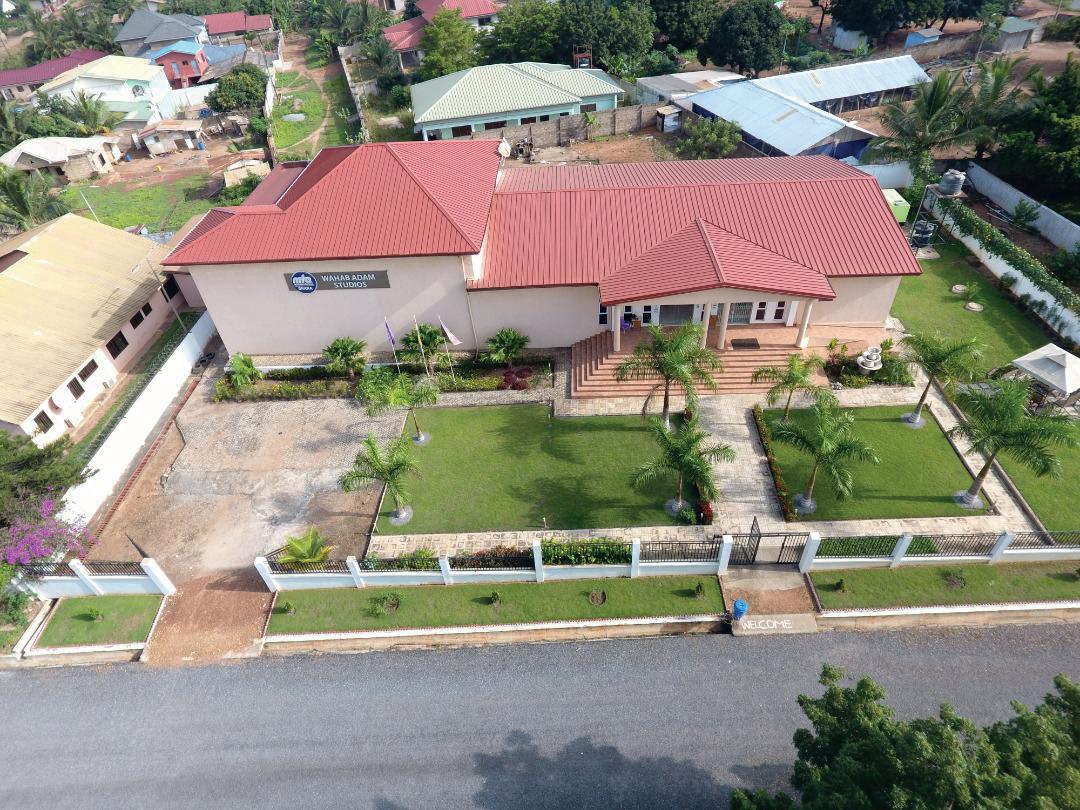
“I am thankful to God Almighty for granting me a sincere and loyal community. I observe that whenever I call upon them for any task or purpose, they swiftly and passionately come forward, in an attempt to outstrip one another, according to their own strength and ability. I can see that they possess devotion and sincerity. Whenever I make a command, they are ready to obey. The truth is that no nation or community can be moulded until they possess this spirit of fervour, sincerity and devotion in obeying and following their leader.
Ahmadiyya Archive & Research Centre (ARC), 22 Deer Park Road, London, SW19 3TL, UK info@alhakam.org | ISSN 2754-7396 Page 5 THE WEEKLY www.alhakam.org A AL HAKAM | Friday 2 December 2022 | Issue CCXLVI
Acceptance of prayers
Hazrat Salman al-Farisira relates that Allah’s Messengersa said:
your Lord is Modest and Munificent. He is ashamed to turn down His servant empty handed when he raises his hands to Him (in supplication)” (Sunan Abi Dawud, Kitab al-Witr, Hadith 1488)
A sincere and loyal community
Page 10 Page
Part
Continued on next page >>
The Messiah, on whom be peace, Continued on next page >>
Was Jesusas
14
Munafiqeen: How to identify and deal with hypocrisy
II
Qatar World Cup 2022: Why Muslim players are prostrating as celebration
Wahab Adam Studios, Ghana | Photo courtesy of MTA Africa
Nasirat (Ahmadi girls aged 7-15) from Lajna Imailllah Ghana met with Hazrat Khalifatul Masih V, may Allah be his Helper, through a virtual mulaqat on 27 November 2022.
The programme started with Fatiha Mubina reciting a portion from the Holy Quran and Safawa Asari presenting the translation. Sofia Mubashar and Farwa
<< Continued from previous page
was made to suffer difficulties and misfortunes, due to the weakness and unwilling nature of his community— among other things. As such, when Jesusas was arrested, one of his greatest disciples, Peter, rejected his Master and Guide; in fact, not only did he reject him, he cursed him three times. Most of the disciples abandoned Christ and fled. In contrast, the example of devotion and loyalty that the companions of the Holy Prophet, peace and blessings of Allah be upon him, demonstrated is unparalleled in the history of the world. They bore all sorts of grief for the Holy Prophetsa as though it was nothing; they even left behind their beloved homeland, and gave up their wealth, property and friends. Ultimately, these companions did not even hesitate or express any regret in laying down their lives for the sake of the Holy Prophetsa. It was this very loyalty and devotion that ultimately blessed them with prosperity.
Similarly, I can see that Allah the Exalted has endowed my community
with an ardour that behoves their rank and status, and they are exemplary in their loyalty and devotion. From the day that I decided to send a delegation to Nasibain, everyone has wished to be chosen for this service and has envied those who have been selected for this purpose. It is their desire that if they were sent instead, this would be their good fortune. Many of our friends presented themselves to embark on this trip. However, before having received these requests, I had already chosen Mirza Khuda Bakhsh Sahib for this mission and had decided that Maulvi Qutb-ud-Din and Miyan Jamal-ud-Din would accompany him. Therefore, I was compelled to turn down these other requests. Nonetheless, I am certain that those who presented themselves for this service with full sincerity and loyalty will not be deprived by Allah the Exalted of their reward, and they will receive their recompense in accordance with their sincerity.
(Hazrat Mirza Ghulam Ahmadas, Malfuzat, Vol. 2, p. 53-54)
“You should wear modest dress and the way you are covering your face now, your head with your headscarf, and your chin and the covering of your cheeks and the loose dress – this is the best way of purdah for you.
“This is how you will show your example to others; other Ahmadi Ghanaians and non-Ahmadi Ghanaians as well. They will ask you, ‘Who are you? You are very modestly dressed, your dress is very good, you look very pious and morally good. […] and when they come to you, you can preach to them. This is how you will become a good Ghanaian girl and woman.”
The nasirah asked Huzooraa what his favourite Ghanaian dish was when he lived in Ghana and whether he learned to cook those dishes. Huzooraa smiled and said:
“I liked so many dishes. Jollof rice – you just showed the picture of Jollof rice – it was also a favourite and I also liked Fufu with Okra soup. This is what I used to like.” With regards to cooking Ghanaian dishes, Huzooraa said:
“I did not learn to cook any [Ghanaian] dish, but I know how to cook.”
The next nasirah asked Huzooraa how children could develop a good relationship with their parents. Huzooraa said:
“Your parents always want good for you, they don’t want anything bad for you. Whenever they give you any advice or ask you to do something, that is for your good. So, you obey them. If they ask you that you go to school and study hard and get good marks, that is for your betterment, for your good. If they asked you, when you come back home, that you complete your homework first, then it is for your good. If they ask you to keep yourself clean, it will benefit you because this is how you can have good health. If they ask you to offer your five daily prayers, it is for the betterment of your spiritual level so that you will get closer to Allah the Almighty in this way.
“Always think that your parents are the people who are the best people in the world who love you, who care for you and who desire good for you. So, always obey them. And this is how you can have good relations with your parents.
“I don’t think there is any parent who does something opposite to this.”
Huzooraa was asked by a nasirah if he was supporting any football team in the FIFA World Cup 2022 and who he thought deserved to win. With a smile, Huzooraa said:
“I’m not watching football, so I don’t know who deserves to win. But when Ghana was playing [its first game], I wished that Ghana should win, but unfortunately, Ghana lost the match. So, if they are going to play some more matches then I wish they become the winner, insha-Allah.”
Adeela Ahmad said there were many names used in reference to Surah al-Fatihah – for example, Umm-ul-Kitab and ash-Shifa She asked what the reason was. Huzooraa explained:
diseases. […] It is the surah which contains all the subject matters which are given in detail in the other part of the Holy Quran.”
The next question was whether Allah would forgive a person who intended to seek forgiveness and mend their ways but suddenly died. Hazrat Khalifatul Masihaa said:
“Yes. If your intention is good and you have decided that you will seek Allah’s forgiveness […] If you are seeking Allah’s mercy, asking for His forgiveness, then even if you die, Allah is All-Merciful, He forgives.”
Huzooraa referred to a hadith that described a man who had murdered a lot of people and desired Allah’s forgiveness. When the man was on his journey to visit a person in a far-off land who would tell him how to seek forgiveness, he died. The angels of hell and heaven began arguing over who would take the man’s soul. Ultimately, it was shown that the man was closer to the land he was trying to reach than to where he came from and therefore he was admitted to heaven.
Huzooraa concluded by saying:
“If at the end you are asking for forgiveness after committing sins or doing something wrong, Allah the Almighty forgives you. Allah is All-Merciful, EverGracious.”
Another nasirah asked what Islam said about make-up and other beauty products for women. Huzooraa said:
“Islam says that you can wear makeup, no problem. But always remember that there are some other duties of a Muslim. You have to offer your daily prayers. When the time for prayer comes, you should not bother that you are wearing make-up so you will not perform wuzu or ablution. You do ablution and offer your prayers – you should not bother about your make-up then.
“If you are only caring for your makeup and leave your prayers and do not fulfil all the requirements which are needed in the prayer then you are committing a sin, you are doing wrong. Otherwise, there is no harm in doing makeup.”
With regards to women using nail polish and performing wuzu, Huzooraa said there was no space between the nail and the nail polish, so a lady could perform wuzu while wearing nail polish and then offer their salat. Huzooraa said hair braids and wigs were also allowed.
Overall, “Islam permits all these things but with the condition that they should not stop you or hinder you from offering your daily prayers or worshipping Allah the Almighty”, Huzooraa said.
Kashifa Mahmud (aged nine) asked what the best way was for her to build a strong relationship with Allah. Hazrat Amirul Momineenaa said:
<< Continued from previous page
Friday Sermons, essay competitions, sittings with Sadr Lajna Ghana and a creative arts and crafts competition where nasirat were asked to make something that would benefit people. Pictures of the various items made by nasirat were shown to Huzooraa along
with a short documentary highlighting the works of Nasirat-ul-Ahmadiyya Ghana.
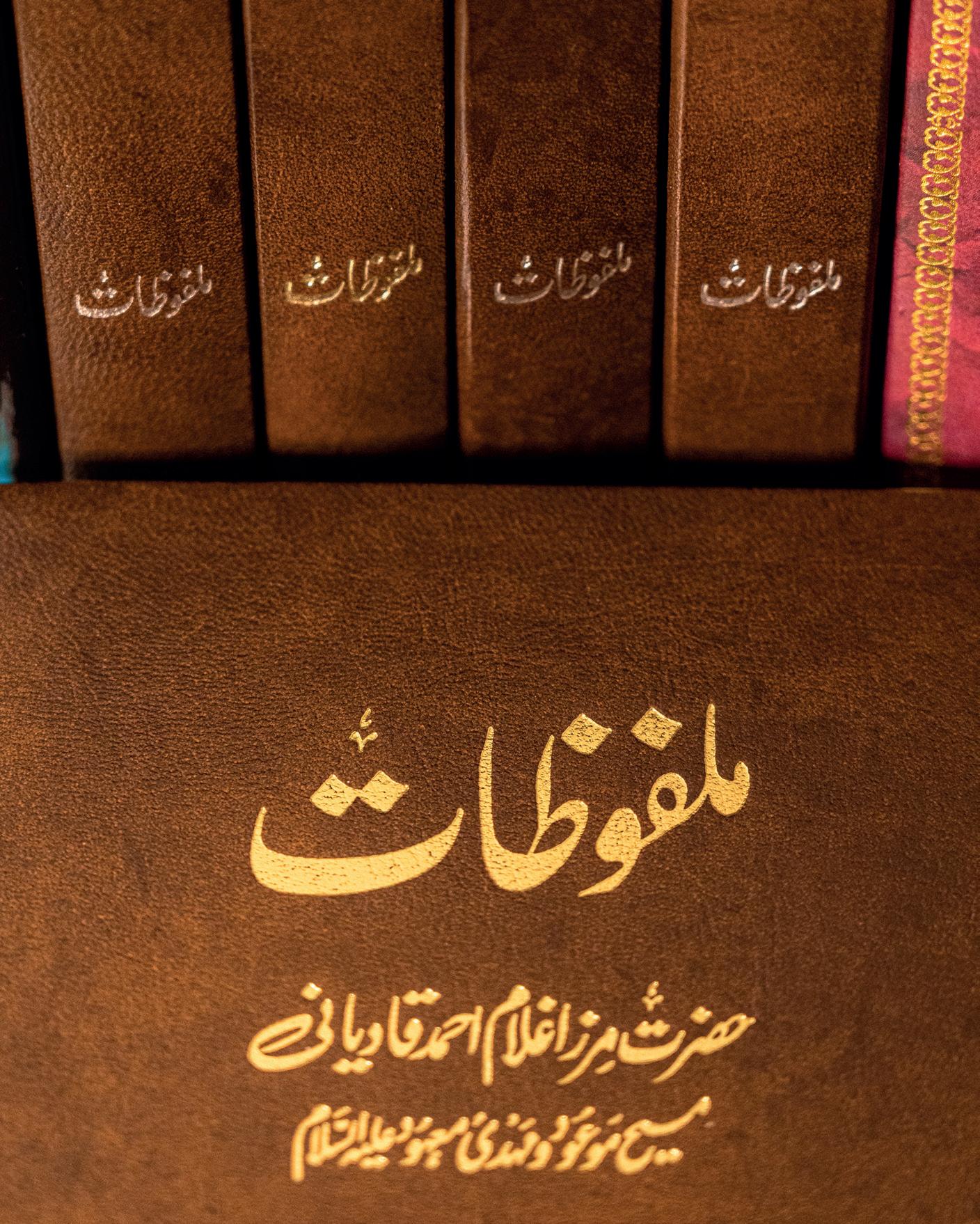
The nasirat were then given the opportunity to ask questions to Hazrat Khalifatul Masihaa
The first questioner asked what the best purdah was for a nasirah in Ghana. In response, Huzooraa said:
“Because this is the surah which contains the gist and the summary of the whole of the Holy Quran. This is why it has different names and this is the basic surah that asks you to praise Allah the Almighty and to seek His refuge. It also has so many other attributes of Allah the Almighty which it contains. Ash-Shifa – The Healer: […] It gives shifa (healing) to your spiritual
“Allah the Almighty says that from seven to ten you should try to observe your daily prayers – offer your daily prayers – so the first thing is if you want a good bond with Allah, you should offer your daily prayers and also read the Holy Quran. And if possible, you should try to learn the meaning of the Holy Quran or at least the meaning of some surahs of the Holy Quran which you recite in your prayers. In this way, you will strengthen your bond with Allah, your relationship with Allah and if you keep on doing it, as you grow up, you will get better knowledge and a better relationship with Allah.
Friday 2 December 2022 | AL HAKAM 2
Photo courtesy of Suhaib Ahmad
Asifa Maryam Ahmad asked Hazrat Khalifatul Masihaa for the interpretation of a dream that she saw where the Promised Messiahas was in white clothes and in the sajdah (prostration) position. Huzooraa said:
“It is a good dream if you have seen that one. It means the Promised Messiahas was praying to Allah the Almighty and he showed that if you wish to get closer to Allah, you should also be in the sajdah position and while offering your prayer, you pray fervently, strongly and bow before Allah. [...] And whenever you need anything, you always ask Allah.
“The best position for getting a close relationship with Allah is sajdah [prostration] – the height of humility. When you do sajdah that means you are completely submitted to Allah. So the Promised Messiahas has shown you that you should also pray in this way.”
Khadija Abu Bakr asked Huzooraa if he would visit the Volta region when he visited Ghana next. Huzooraa lovingly smiled and asked Khadija if she was from the Volta region, to which she replied in the affirmative. Huzooraa said that as of yet, he did not know if his next visit to Ghana would include the Volta region as well.
Maryam Wahab asked what subjects and professions nasirat in Ghana should study and pursue. Huzooraa recommended:
“Whichever subject you like, you can study. You can be a doctor, you can be a teacher, you can study law, you can study some other subjects. So, whichever you wish, you can study and they are all beneficial for you. Always see that you should study those subjects which are beneficial for your country fellows, your nation and your Jamaat. [As long as] you can help your nation and if you can help the Jamaat after studying, then all those subjects are good for you.”
The nasirah asked why there was a
division in Islam after the demise of the Holy Prophet Muhammadsa. Huzooraa clarified:
“It was not immediately after the demise of the Holy Prophetsa – there was a Khilafate-Rashida for 30 years and during the time of Hazrat Usman that division started, the rift started between Muslims and it was because of the hypocrites of that time who did not want Islam to flourish.
“But it was also prophesied by the Holy Prophetsa that after my demise there will be a true Khilafat, that is Khilafat-e-Rashida for some years and then there will be a rift and division amongst Muslims and after that – there’s a narration of the Holy Prophetsa
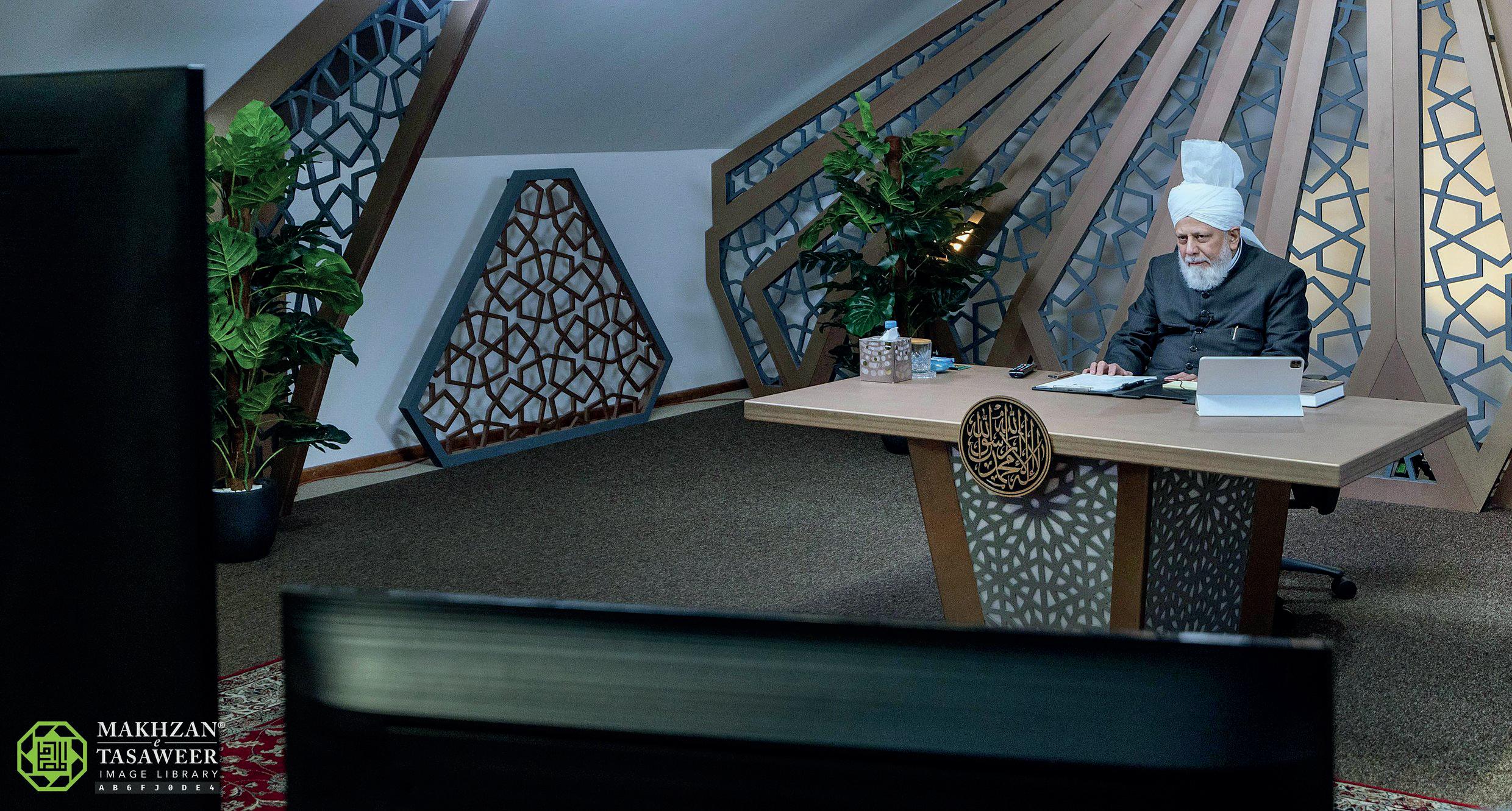
– there will be a rift for a longer period, almost a thousand years and after that, the Promised Messiah will come and he will again try to unite the Muslims.
“This is what we Ahmadis have been doing that we are trying to unite the Muslims and this is the prophecy of the Holy Prophetsa that after the demise of the Promised Messiahas the institution of Khilafat will start. That is what we are seeing that now there’s no Khilafat among other Muslims. There is a Khilafat among Ahmadis only and people are coming to join us day by day. Every year, hundreds of thousands of people come to join the
Jamaat, so this is how we are increasing and others are decreasing.”
Huzooraa said:
“Whenever there will be some worldly desire among Muslims then there will be a division and that is what we saw.” Huzooraa said the so-called ‘khilafat’ after the Khilafate-Rashida was in fact kingship and it was Khilafat that was inherited, “whereas there’s no concept of inherited Khilafat in Islam.”
Huzooraa then spoke to Sadr Lajna Ghana, who asked Huzooraa for continuous prayers and guidance. Thereafter, Huzooraa conveyed his salaam and the meeting came to an end.
3 AL HAKAM | Friday 2 December 2022
Allah the Almighty says that from seven to ten you should try to observe your daily prayers – offer your daily prayers – so the first thing is if you want a good bond with Allah, you should offer your daily prayers and also read the Holy Quran. And if possible, you should try to learn the meaning of the Holy Quran or at least the meaning of some surahs of the Holy Quran which you recite in your prayers.
In this way, you will strengthen your bond with Allah, your relationship with Allah and if you keep on doing it, as you grow up, you will get better knowledge and a better relationship with Allah.
“
This Week in History
Friday Sermon, Hazrat Khalifatul Masih Vaa instructed the Jamaat to offer two nawafil every day, and to remember the Ahmadis all around the world in their prayers, particularly those who were being persecuted and facing any kind of problem:
“Every Ahmadi should offer at least two nawafil every day, for those who are facing any kind of problem due to [their faith in] Ahmadiyyat, who are being deprived of their civilian and religious rights due to the oppressive laws. Moreover, especially pray for the Jamaat’s progress as well.”
4 December 2009: During his Friday Sermon on this day, Hazrat Khalifatul Masih Vaa spoke about the increasing uproar in Switzerland against minarets on mosques, and stated that it seemed there was a deep conspiracy behind these actions.
4 December 2012: Hazrat Khalifatul Masih Vaa answered questions from a range of media outlets during a 40-minute press conference in the Press Room of the European Parliament in Brussels.

A number of global media organisations, including those from the UK, Spain, France, Belgium, Pakistan and other countries, attended.
After this, Huzooraa delivered the keynote address at the European Parliament to a packed audience of more than 350 guests representing 30 countries. The event was hosted by the ‘European Parliament Friends of Ahmadiyya Muslims Group’, whose chair and vice-chairs all took to the stage to welcome Huzooraa. Martin Schulz MEP and President of the European Parliament also came to meet with Huzooraa.
2 December

2 December 2005: During his tour of Mauritius, Hazrat Khalifatul Masih Vaa inaugurated the 44th Jalsa Salana Mauritius with his Friday Sermon. It was the first time that a Khalifatul Masih had graced the Jalsa Salana of Mauritius.
2 December 2011: During his Friday
Sermon, Hazrat Khalifatul Masih Vaa shed light on the situation of the world in general and the Muslim world in particular, and called the attention of Ahmadis towards fervent supplications for the betterment of the world.
2 December 2016: During his Friday Sermon, Hazrat Khalifatul Masih Vaa mentioned Sheikh Sajid Mahmud Sahib of Gulzar-e-Hijri, Karachi, who had
been martyred on 27 November.
Huzooraa also mentioned Sheikh Abdul Qadeer Sahib, a darwesh of Qadian, who had passed away on 26 November at the age of 92.
3-4 December
3 December 2010: During his
4 December 2015: During his Friday Sermon on this day, Hazrat Khalifatul Masih Vaa cautioned the world’s leaders and governments about the potential escalation of current conflicts into a full-scale World War III. Huzooraa highlighted how the world’s problems stemmed from grave injustices perpetrated by both Muslim countries against their own people as well as injustices perpetrated by other world powers. Huzooraa called upon Ahmadi Muslims worldwide to pray
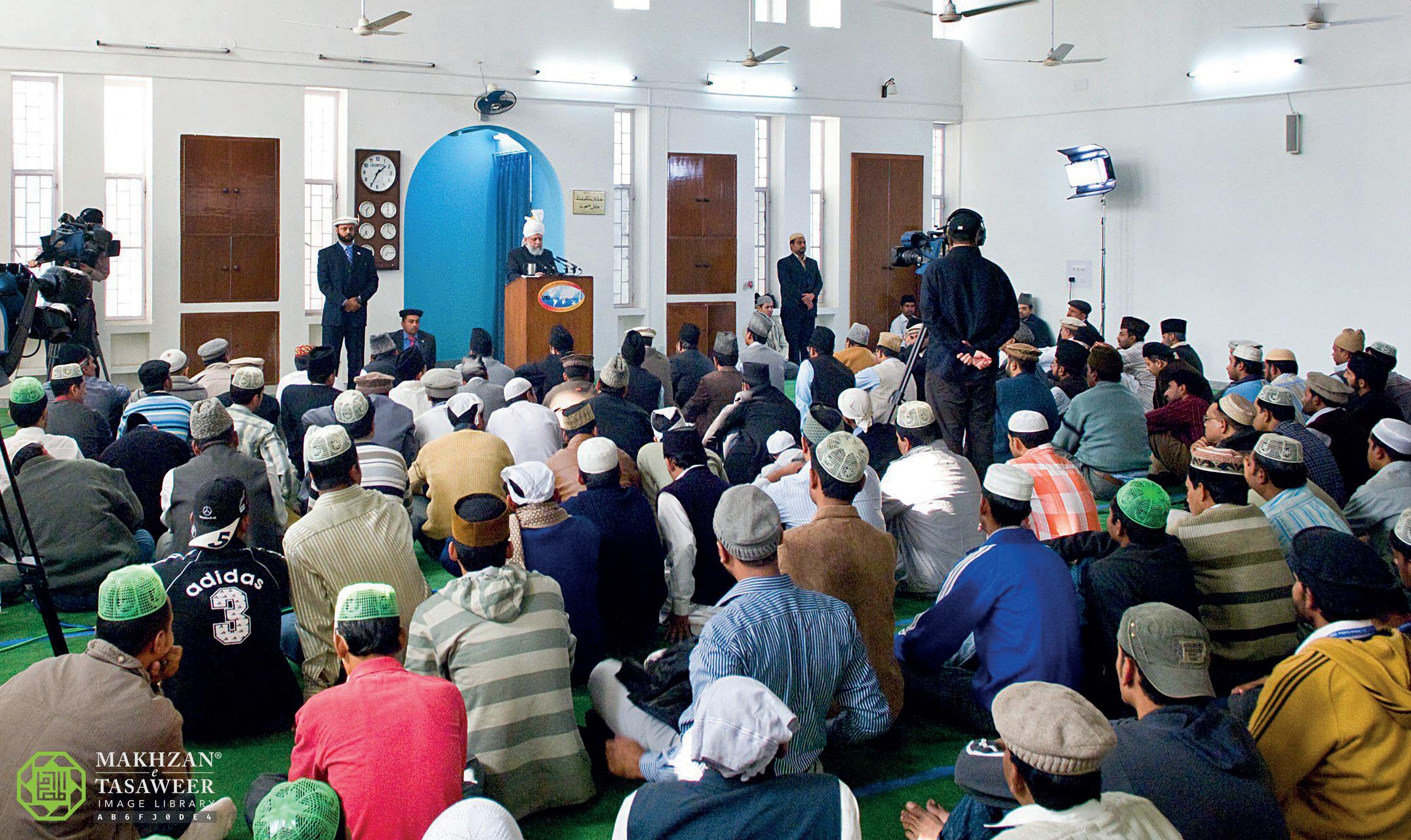
Friday 2 December 2022 | AL HAKAM 4
Hazrat Khalifatul Masih Vaa delivering his historic address at the European Parliament Brussels
Hazrat Khalifatul Masih Vaa delivering the Friday Sermon from Baitul Hadi Mosque in Delhi
2 - 8 December
for long-lasting peace in the world: “Today the world is in great danger and moving rapidly towards a catastrophe and so special and sincere prayers are required from members of our community.” (Head of Ahmadiyya Muslim Community warns of risk of Third World War, www.pressahmadiyya.com)
4 December 2016: Hazrat Khalifatul Masih Vaa delivered the concluding address at the National Refresher Course for Office Bearers of Lajna Imaillah UK.
5 December

5 December 2003: During his Friday Sermon on this day, Hazrat Khalifatul Masih Vaa instructed that every Ahmadi must attain at least an FA degree (similar to the UK A Levels). Before this, Hazrat Khalifatul Masih IIIrh had instructed the Ahmadis in Pakistan to at least pass matriculation (equivalent to UK GCSE).
5 December 2008: During his Friday Sermon on this day, delivered from the Baitul Hadi Mosque in Delhi, India, Hazrat Khalifatul Masih Vaa stated that there was a change of plan in his ongoing tour due to some law and order issues within the country, and instructed the members of the Jamaat to cancel their plans of travel to attend the Jalsa Salana Qadian.
6 December 2008: Hazrat Khalifatul Masih Vaa returned to London after shortening his tour of India, due to some law and order issue there.
7 December 2012: During his Friday Sermon on this day, Hazrat Khalifatul Masih Vaa said that some opponents of the Jamaat had desecrated around 120 tombstones in an Ahmadiyya graveyard in Model Town, Lahore, Pakistan.
8 December 2017: During his Friday Sermon on this day, Hazrat Khalifatul Masih Vaa advised the governments of the Muslim countries to take good political decisions, and called the attention of Ahmadis towards prayers for the Muslim world.
Opinion
Jesus caught in gender debate at Trinity College, Cambridge
Dean of Trinity College, Dr Michael Banner, defended a guest sermon given by a postdoctoral researcher, Joshua Heath, who contested Jesus’ gender, as reported by The Telegraph (26 November, 2022). The following is an opinion comment.
While every discipline in science and humanities continues to progress at an unprecedented pace, ethics – once the fulcrum of human society – seems to be shrinking and diminishing into thin air. Gone are the days when debates on social issues were accompanied by a set of ethical rules, said or unsaid, that would evolve for the better with time. But this trend, like many other trends, has now taken a U-turn.
It is sad to see we have ended up living in a world where ethical bounds and remits no longer come in the user’s manual of social debate – quite the contrary.
Religious art, where holy personages are depicted, has remained a perfect example of “one man’s pork is another man’s poison” throughout modern history. Where Islam stood strongly against such visual depiction, Christians seemed more than happy to have Jesus visually depicted in his various biographical situations, especially the scene of the crucifixion. Every church had to have and has to have a Jesus hanging on the Cross in the most prominent part of the church, usually towering above the Altar and facing the congregants.
The age of Renaissance saw such depictions gain unprecedented momentum when faith was at stake and Jesus, along with all elements of Christian faith, had to be glorified in art form. As Renaissance was rooted in Europe, the art of the age saw Jesus lose his Syrian features and acquire a purely European look; locks of blond hair falling
on his shoulders, a glowing Caucasian skin colour and gleaming blue eyes. No one seems to have cried “Heresy!” when Jesus lost his true identity and was “naturalised” through art into a perfect Caucasian character.
To have given birth to such a Europeanlooking man, similar features had to be given to his mother, and this, for the Renaissance artists, was no big deal.
The only voices to have cried “Heresy!” have always come from Muslims who see a visual depiction of any holy personage as unethical. But who even cares about Muslims? Such a standpoint was seen as backward, regressive and, hence, negligible. Add to this their violent retaliation on such occasions and most Muslim voices lost the plot altogether.
Depicting Jesus became an art form in its own right and artists continued to give it a go in whatever way they liked. So here we have, in our modern world, a Jesus with all Caucasian features and a carved out, muscular physique nailed to the cross. What is quite strange is that no one seems to have ever asked why Jesus, a holy prophet of God, was taken out of his class of Prophets and placed on the runway of fitness aficionados.
As if all this were not enough to depict his supernatural masculinity, and perhaps to add a bit more colour to the paintings and sculptures, the artists rarely forgot to place the wound, infamously inflicted by the Lance of Longinus, on the right side of his chest.
As Renaissance grew into Enlightenment and the latter into Modernity and then Postmodernity, who would have thought that the unrestricted, unrestrained, unconstrained and, in some cases, unethical mind of postModern times would see in the wound of Jesus Christ, the features of the female genitalia. To see this wound in such light as a possibility that Jesus might have been a
transgender is nothing but utter nonsense –howsoever wrapped in the garb of academic pursuit.
Putting the awe of post-doctoral research and the reverence of universities housing such research aside, such a claim is no more than a vulgar urge to deprive the artistically depicted Jesus of the little piece of cloth tied around his pelvic area. More than academic research, it seems like a calling-all-artists kind of invitation to start depicting Jesus with the so-farhidden elements of his masculinity clearly displayed. This is precisely why Islam opposes any form of visual depiction of holy persons of any religion, lest the flowing rivers of imagination eventually fall into the ocean of obscenity and even eroticism.
Hence, research scholar Joshua Heath and his advocate, Dr Michael Banner, dean at Trinity College, are not solely to blame for the “trans”gression, but the whole of the artistic tradition that stood for the visual depiction of holy personages shares the blame (and shame). Mr Heath might have voiced his theory, but those who depicted Jesus throughout the course of many centuries have actually asked for such a reactionary backlash.
And what has happened to the basic ethics where religious sentiment was cared for? While everyone seems to be treading on eggshells around the LGBTQ+ issues, why is a religious sentiment so brutally hurt as and when one feels like? How ironic it is that Joshua Heath found no better place to blast his imaginative theory than a chapel full of Christians. Even more ironic that the chapel is situated inside the Trinity College of Cambridge University.
However, this write-up is not a piece of religious debate. The call here is as simple as the newfound debate over sexuality and associated pronouns: If someone wants to be called a “he”, call “them” a “he”; if someone thinks “they” could be a “she”, refer to “them” as “she”. Proponents could see it as a taster of their own medicine. Violating such demands has seen lawsuits filed against the “perpetrators” of this socalled modernity.
How sad it is that Jesus is no longer around to file such a lawsuit. He was a male, he identified himself as such and, religious debate aside, he deserves to be referred to as a male – on the standards of none other than modern society itself.
Even sadder is that charges of defamation and libel cannot be filed on behalf of a deceased victim if someone wants to do so. Everyone bears their own cross, and so does Jesus (once again, unfortunately). And no, we are not opening here the debate whether he is even deceased!

5 AL HAKAM | Friday 2 December 2022
6-8
December
The Holy Quran:
A code of conduct and a source of morality, etiquette and manners
V.20) and, “walk thou at a moderate pace”. (Surah Luqman, Ch.31: V.20) It teaches us how to converse: “lower thy voice” (Surah Luqman, Ch.31: V.20 ), “say the right word” (Surah an-Nisa, Ch.4: V.10), and “speak to them words of kindness” (Surah an-Nisa, Ch.4: V.9) It further instructs, “speak to men kindly” (Surah al-Baqarah, Ch.2: V.84), “O ye who believe! let not one people deride [another people] […] nor call [one another] by nicknames’ (Surah al-Hujurat, Ch.49: V.12) Moreover, while exhorting Muslims about how they should treat their parents, Allah the Almighty states, “‘never say unto them any word expressive of disgust nor reproach them, but [always] address them with excellent speech.’” (Surah Bani Israel, Ch.17: V.24)
The Quran teaches us how to direct our gaze: “Stretch not thine eyes towards what We have bestowed on others” (Surah Taha, Ch.20: V.132)
It teaches us how our gatherings should be: “O ye who believe! avoid most of suspicions; for suspicion in some cases is a sin. And spy not, nor back-bite one another. […]” (Surah al-Hujurat, Ch.49: V.13) There is no doubt this means spying on people’s affairs and flaws, but the more pious a person becomes, the more he deepens his understanding of avoiding everything that could be snooping. Here, a story came to my mind mentioned by Ibn al-Jawzi in his book al-Adhkia, he narrates: “Yahya al-Marwazi said: One day, I was having food with Haroon al-Rashid, he then raised his head towards a servant and spoke to him in Persian, so I said to him: ‘O Commander of the Faithful! If you want to tell him something private, beware that I understand Persian.’ He became pleased with me and said: ‘I do not conceal any secret.’”
hands so openly that one wastes their wealth in such a way that when money is required for a genuine national need, they find themselves unable to contribute to it.
Therefore, Muslims’ hands should be used only for good; it was also among the conditions of swearing allegiance to the Holy Prophetsa that the believers “will not steal”. (Surah al-Mumtahana, Ch.60: V.13)
The Holy Quran instructs that one should not enter others’ houses without first notifying the residents of one’s arrival by saluting them and seeking their permission, and without first determining whether they want to receive them or not: “O ye who believe! enter not houses other than your own until you have asked leave and saluted the inmates thereof. That is better for you, that you may be heedful.” (Surah an-Nur, Ch.24: V.28)
This injunction not only puts a stop to possible scandals but also serves to save people from being seen in conditions likely to give rise to suspicion. It also teaches us to respect the privacy of other people’s houses and offices.
In addition, the Quran sets forth the attributes that we have to attain to be among the righteous. It describes the Godfearing people as follows: “Those who spend in prosperity and adversity, and those who suppress anger and pardon men; and Allah loves those who do good;” (Sura Aale-Imran, Ch.3: V.135)
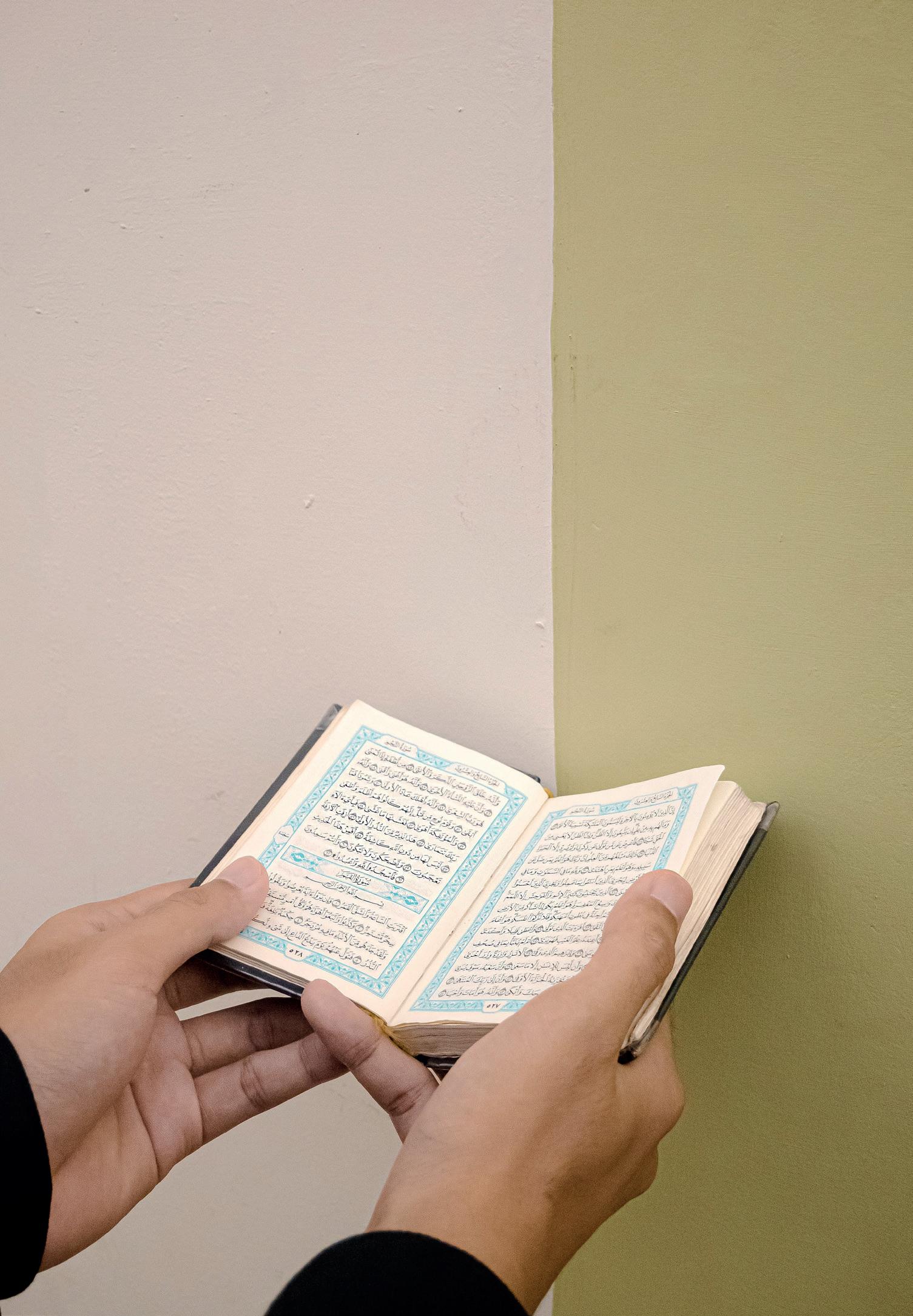
Thus, they are charitable and philanthropic. When they are offended, they not only restrain their anger and grant the offender a complete pardon, but they also do a suitable act of kindness to him and bestow some favour on him.
Reem Shraiky International Translation and Research Office, UK
The Holy Prophetsa stated:
“This Quran is the Banquet from Allah, so take as much as you can from His banquet. Indeed, this Quran is the Rope of Allah, and it is the clear Light and effective Healing. It is Protection for the one who clings to it and Rescue for the one who follows it. It is not crooked and it puts things straight. Its wonders do not cease. It does not wear out with repetition. So, recite it, for Allah will reward you for the recitation of every letter with a tenfold reward, I do not say that AlifLaam-Meem is one letter, but alif is a letter, laam is a letter and meem is a letter.” (AlMustadrak)
The Holy Quran is a constitution for all areas of life, but I will focus especially on how the Holy Quran laid the foundation for ethics, etiquette, and good behaviour.
It regulates mankind’s natural needs, such as marriage, eating, drinking, and socialising in a way that makes them civilised and moral. The Quranic laws are in perfect harmony with human nature, as they prohibit all that human nature rejects.
Regarding marriage, the Holy Quran in chapter 4, verses 23-25, lists those women a man is forbidden to marry. Furthermore, Islam forbids adultery, but unlike the Biblical commandment, which says: “Thou shalt not commit adultery” (Exodus
20:14), the Quran says, “Come not near unto adultery” (Surah Bani Israel, Ch.17: V.33). By doing so, the Holy Quran not only prohibits the actual act of adultery but also seeks to close all avenues leading to it. In addition, as it is the eyes through which most evil thoughts enter the mind, the Holy Quran commands believing men and women to lower their gazes when they meet each other:
“Say to the believing men that they restrain their eyes and guard their private parts. That is purer for them […] And say to the believing women that they restrain their eyes and guard their private parts[...]” (Surah an-Nur, Ch.31: V.31)
It is true that the word جورف (furuj) in this verse, which has been translated as “private parts”, means the part or parts of the body that are indecent for a person to expose, but it also means the avenues through which evil thoughts find access to the human heart and mind. It covers all parts and organs of the body, such as the eyes, ears, tongue, hands, feet, etc. Thus, believers should carefully guard all the avenues through which sin can find access to their minds.
What is particularly amazing is that the Holy Quran does not simply mention these avenues under the umbrella of this word (i.e., furuj) alone, but also gives other wonderful injunctions on how we should best carry ourselves: “walk not in the earth haughtily” (Surah Luqman, Ch.31:
Allah the Almighty states: “And follow not that of which thou hast no knowledge. Verily, the ear and the eye and the heart—all these shall be called to account” (Surah Bani Israel, Ch.17: V.37)
The Holy Quran cut at the root all sources of suspicion, which are in sequence: “the ear”, “the eye” and “the heart”. The “ear” is the first avenue through which most suspicions enter one’s mind. Suspicions are mainly caused by baseless hearsay that one hears about another person. The second source is sight; a person sees another doing something, and he or she interprets it wrongly. The last source of suspicion is the fabrication of a diseased mind.
This verse makes it clear we will be held accountable for having listened to anything we had no right to listen to, for having seen something we should not have seen, and for harbouring evil thoughts about others. Mere evidence from the ear, the eye or the heart is not sufficient to judge a person or form an unfavourable opinion about them.
The Quran taught us how to spend: “And spend for the cause of Allah, and cast not yourselves into ruin with your own hands, and do good” (Surah al-Baqarah, Ch.2: V.196) And, “Keep not thy hand chained to thy neck, nor stretch it out an entire stretching, lest thou sit down blamed [or] exhausted” (Surah Bani Israel, Ch.17: V.30)
These verses teach us the right way to spend our money. One should not be so miserly as if their hands were tied to their neck, nor should one stretch forth their
Hazrat Alira, the fourth caliph in Islam, delivered a sermon about the characteristics of the righteous known as ‘khutbah almuttaqeen’ where he mentioned many qualities of a righteous person. For example, he said:
“He (i.e. the righteous) has strength in religion, determination along with leniency, faith with conviction, eagerness in seeking knowledge in forbearance, moderation in riches, devotion in worship, gracefulness in starvation, endurance in hardship, desire for the lawful, pleasure in guidance and hatred of greed.
“He performs virtuous deeds but still feels afraid. In the evening, he is anxious to offer thanks (to Allah). In the morning, his anxiety is to remember (Allah). His hopes are simple, his shortcomings are few, his heart fears (Allah), his spirit is content, his meal is small and simple, his religion is safe, his desires are dead and his anger is suppressed. Indecent speech is far from him, his words are lenient, his evils are non-existent, his virtues are always present, his good is ahead; and mischief has turned its face (from him). He is dignified during calamities, patient in distresses and thankful during ease.”
There is no doubt these qualities are found only in those who follow the Holy Quran wholeheartedly and the best example is the Holy Prophetsa whose character was the Quran, as his wife, Hazrat Aishara stated. In addition, she said, “He was a walking Quran”.
As we believe the Quran is valid for every time and era, this means the one who was a walking Quran, Muhammad al-Mustafasa, will remain a role model for us forever.
Friday 2 December 2022 | AL HAKAM 6
Qatar World Cup 2022: Why Muslim players are prostrating as celebration

in the prostration position. (Sahih Muslim, hadith no. 482)
Prostration (sajdah) is one of the various postures a Muslim is commanded to do during prayer.
The Promised Messiahas has explained:
“The various postures of the Salat demonstrate respect, humility, and meekness. In Qiyam (standing posture) the worshipper stands with his arms folded as a slave stands respectfully before his master and king. In Ruku‘ (bowing) the worshipper bends down in humility. The climax of humility is reached in Sajdah (prostration), which indicates extreme helplessness.” (Speeches to Jalsa Salana, 1906, pp. 6-8)
Prostration of gratification commonly referred to as sajda shukr by Muslims is when a person, overwhelmed with emotions and gratitude, falls into prostration at the threshold of God and expresses their immense gratefulness to Allah. Muslims do this to show all their success is due to the blessing of God and not one’s faculties. This helps man remain humble.
Hazrat Mirza Ghulam Ahmadas, the Promised Messiah and Imam Mahdi, explained:
Ahmad Al Hakam
Moroccan players, after their historic 2–0 win against Belgium in the FIFA World Cup 2022, fell into prostration on the pitch of the Al Thumama Stadium in Qatar, celebrating their victory. The scenes of the players falling into sajdah (prostration) were spread and discussed across social media.
But why are Muslim players celebrating in this way?
It is common to see one’s favourite football player, or team, celebrate their goal. Some players, with great enthusiasm, slide on the pitch, leaving skid marks; some dance; and some players huddle whilst others decide to take their shirts off. Cristiano Ronaldo, arguably one of the best football
players along with Lionel Messi, is known for his “Siuu” celebration; you may have seen fans of Ronaldo celebrate in the same way when they score a goal in a friendly game at your local park. Regardless, some argue that no football game is “complete” without a goal celebration. Goal or victory celebrations, fans often say, are a way by which football players connect with fans.
However, Muslim players often fall into prostration and decide to connect with God as they score and gain victory.
Prostration: The pinnacle of humility
Muslims attribute all their success to Allah, for they believe it is He who bestows man with the victory he makes efforts for. When Muslims fall into prostration, they thank
God, acknowledging that He was the one who bestowed them with the faculties and strength to attain their victory; whatever the aim may be, so long as it is pious. The Holy Quran states, “And that man will have nothing but what he strives for.” (Surah anNajm, Ch.53: V.40)
After years of exile, when the Holy Prophetsa entered back into Mecca as a conqueror with 10,000 companions, instead of holding his head high as some might do during such a triumph, the Holy Prophetsa was seen bowing his head out of humility as he rode his camel with his beard touching the camel’s back. This is true humility and the realisation that victory is from God alone. This is the example true Muslims attempt to follow.
The Holy Prophetsa said that man is closest to his Lord during prayer when he is
“[…] it is necessary and incumbent on a believer to perform prostrations of gratitude before God Almighty whenever they are blessed with an achievement that God did not let their effort go in vain. The result of this gratitude will be that a person will increase in their love of God Almighty and grow in faith.” (Malfuzat [English], Vol. 1, p. 153)
Recently, a child asked Hazrat Khalifatul Masih Vaa why there were various postures and movements in the Islamic prayer.
Huzooraa said:
Majlis Ansarullah Ijtema, Sri Lanka
A Abdul Aziz
Sri Lanka Correspondent
Majlis Ansarullah Sri Lanka held their annual Ijtema in Pasyala on 6 and 7 November 2022. The theme for this year was tabligh. This was the first time a Jamaat’s auxiliary organisation in Sri Lanka held their Ijtema after the Covid-19 pandemic.
On the first day, various sports competitions were held. The second day’s programme began with Tahajjud and Fajr prayers, followed by dars and breakfast.
After the flag hoisting, the morning session was presided over by the national president, S Nizam Khan Sahib. He spoke about the history of Jamaat-e-Ahmadiyya Sri Lanka and how Allah the Almighty had blessed the Jamaat.
Sadr Majlis Ansarullah Sri Lanka, IA Mashood Ahmad Sahib explained to Ansar that one should not think that we were old and we could not do anything. We had to strive to do our best to perform tabligh and serve the Jamaat.
This was followed by various academic
competitions.
After this, a documentary was played about living a healthy lifestyle, followed by lunch and Zuhr and Asr prayers.
During the final session, missionary-incharge AB Mushtaq Ahmad Sahib delivered a speech where he narrated certain historic incidents to rejuvenate the faith of those present. The prize-giving ceremony took place after this, followed by a silent prayer and the event concluded.
“Allah the Exalted has taught Muslims the perfect way to worship; first, you stand up and fold your hands like this […] Then another state arises in the heart to ask Him, then you move like this and bow down, thus the state of ruku‘ comes, then you stand up anxiously and say, ‘O Allah, listen to my supplication’, then, just as a man is sometimes very desperate and very anxious, he stands up and asks someone [in the same way you] then stand up and say sami‘Allahu li man hamidah [Allah listens to the one, who praises Him]. Then you are overcome by a state of anxiety again and you suddenly go into sajdah and pray to Allah Almighty again, crying fervently. Then you sit up and then you go into sajdah, then you stand up once again and pray, then you sit down for at-tahiyyat and offer supplications; and then you say the salaam. Allah the Exalted has taught us the different postures for salat because they are different expressions of a person’s humility.” (Al Hakam, Ahmadi children should become good role models to preach to the world: Atfal from Sweden meet Huzoor, Issue 245, p. 1)
So whenever you see Muslim players celebrating their victory in prostration, know it is how Muslims connect with Allah and attribute all success to Him.
7 AL HAKAM | Friday 2 December 2022
Jalees
Coming from every distant track
A delegation from the United Presbyterian Church, USA, visits


Qadian
The holy land of Qadian witnessed a faithinspiring sight and another fulfilment of the prophecy “They shall come from every distant track” on 13 October 1969.
It was a surprise and a joyous occasion for the natives of Qadian when, after travelling from America, a delegation of 26 people from the United Presbyterian Church in the United States arrived to visit the holy land of Qadian.
When these guests, who had travelled thousands of miles, set foot in the hamlet of the Messiah and received the privilege of visiting the land he once walked on, the then 88-year-old prophecy of the beloved of God, the Promised Messiah, was once again fulfilled.
In 1947, when the partition of the Indian sub-continent happened, the markaz of the Jamaat was shifted to Lahore and then to Rabwah after the migration from Qadian. However, Qadian, which holds the honour of being the birthplace and burial place of the Promised Messiahas, shall forever be the birthplace of Islam Ahmadiyyat and a sacred and respected land for all Ahmadi Muslims.
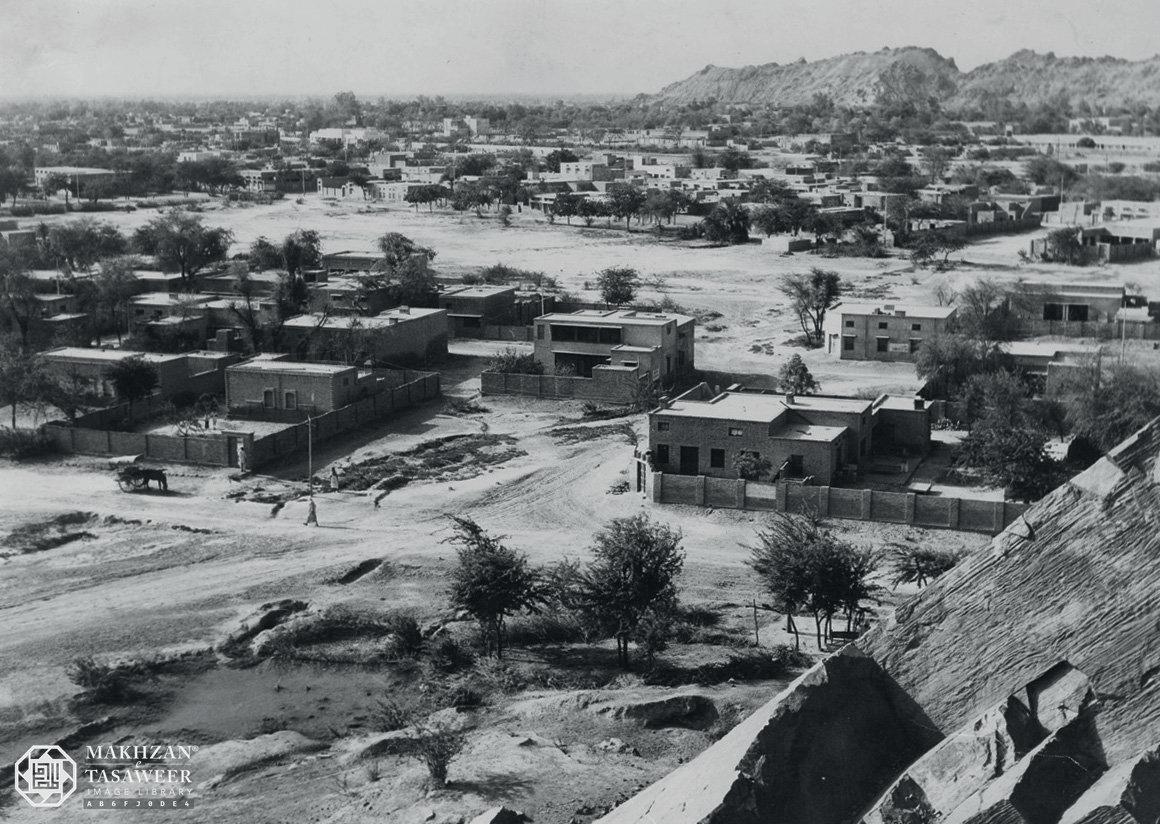
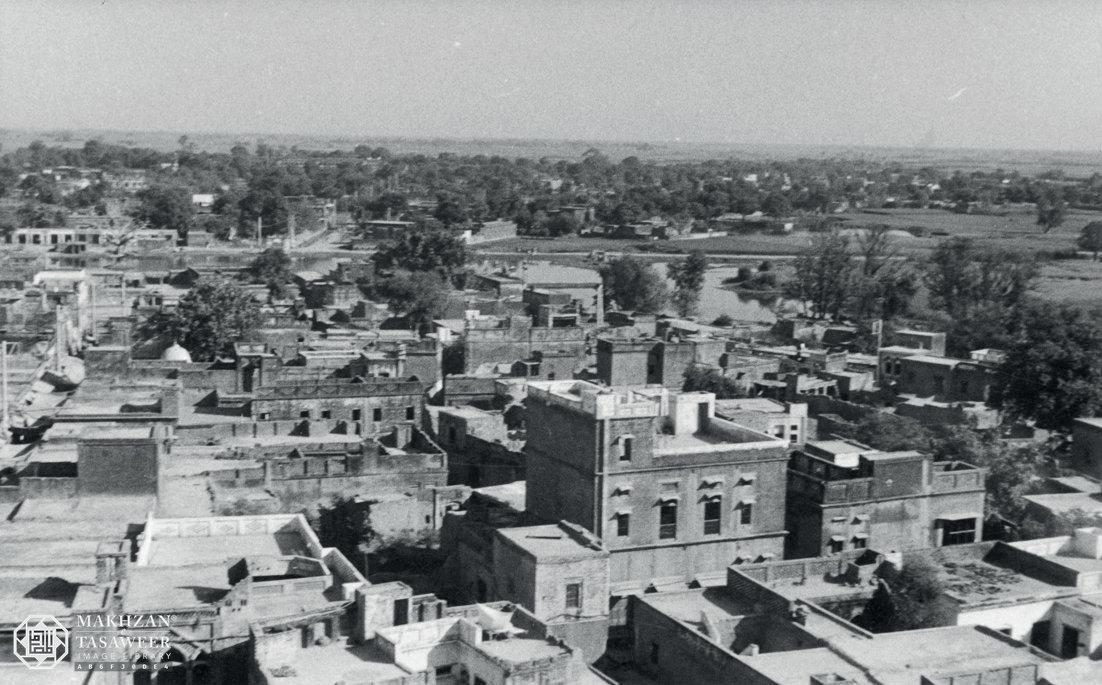
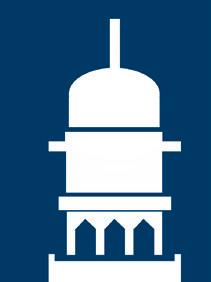
The aforementioned delegation consisted of 19 women and 7 men and they reached Qadian at 3:15 am.
Before their arrival, the principal of Baring Union Church College, Batala, Dr Ram Singh Sahib, informed the Jamaat’s administration in Qadian about a month prior that a delegation of 30-32 members from the Presbyterian Church was set to come to India. They said that the members of the delegation were also scheduled to visit Qadian for some time after coming to Batala.
Thus, adequate arrangements were made to fulfil the wishes of the distinguished guests. Two days before the arrival of the delegation, the aforementioned doctor informed the Jamaat that the delegation would reach Batala on 13 October. Since the delegation members were to return to Delhi by plane from Amritsar on the same day at night, they could only stay in Qadian for two hours. Therefore, a programme was prepared by the Jamaat to make maximum use of this short time.
The members of the delegation were retired and religiously minded people with a deep interest in religion. The delegation arrived in Qadian where they were warmly welcomed with slogans of ‘Ahlan wa Sahlan wa Marhaban’.
After this warm welcome, Sahibzada Mirza Waseem Ahmad, Nazir Da‘wat-
o-Tabligh, members of the Jamaat, who were well-versed in English, introduced them to the Jamaat and gave them some basic information whilst answering some questions they had. All the members of the delegation, after visiting Masjid Mubarak, Masjid Al Aqsa, Darul Masih and Bahishti Maqbarah, went to the guest house, where refreshments were arranged under a pleasant canopy.
A short meeting was held there, which began with the recitation from the Holy Quran, in which Maulvi Javed Iqbal Sahib recited the last ruku‘ of Surah al-Kahf. The English translation of the same part of the Quran was read out by Malik Salahuddin Sahib MA.
During the proceedings of the meeting, Hazrat Maulana Abdur Rahman Sahib Fazil and Sahibzada Mirza Waseem Ahmad Sahib, and the distinguished guests’ party leader, James D Nesbitt, were seated together. After the English translation was read, at the direction of Sahibzada Mirza Waseem Ahmad Sahib, Sheikh Abdul Hameed Sahib BA, then Secretary Jaidad, read out the welcome address on behalf of Sahibzada Sahib.
Every member of the delegation listened to this address with full attention and enthusiasm. Several members also took notes. Some had small tape recorders on
which they recorded the proceedings of the meeting. Members of the delegation then wished to see the photo of the founder of the Jamaat, which they were later shown.
According to the weather of Punjab, the guests were treated to cold drinks. At the end of the address, Mr James, the delegation
leader, made a short speech on behalf of the delegation. He said that they were residents of different states of America and came to visit India for two months on behalf of the Church. He said they were inspecting the Christian missions and the work of their missionaries in these places. In doing so,
Friday 2 December 2022 | AL HAKAM 8
Awwab Saad Hayat Al Hakam
A series looking at the high standard of morals of the Promised Messiahas, his Khulafa and the hospitality of the Ahmadiyya Muslim Community when receiving visitors
Old scene of Qadian Old scene of Rabwah
they also considered the study of the centres of other religions of the country and their religious efforts. Accordingly, they had planned to visit Qadian. He expressed his joy for the hospitality received and said that he and the delegation would all carefully study the literature given by the Jamaat.
Since Dr Ram Singh himself could not come to Qadian on this occasion, Mr Low, professor of Baring College, Batala, represented him and thanked the Ahmadiyya Jamaat for their warm hospitality and meeting.
After the meeting, the guests were told that various pieces of literature about the Jamaat were available in the adjacent room and that they were welcome to make their selections. There were serialised English literature books on the tables. Another table was decorated with a display of the translation of the Holy Quran and other Islamic literature published by the Ahmadiyya Jamaat in foreign countries. From this display, the publishing efforts of the Jamaat could be estimated to some extent.
The members eagerly went through all the literature of the Jamaat and chose the books and pamphlets of their choice. Mr James D Nesbitt was also given various pieces of literature along with the English translation of the Holy Quran presented by Sahibzada Mirza Waseem Ahmad Sahib. The collection presented to the guest included
the following books and pamphlets: Why Islam is dear to me, The Messiah in Kashmir, Jesus in India, Our Teaching, The Philosophy of the Teachings of Islam, Four Questions by Mr Sirajuddin, a Christian, and their Answers, and various more.

On this occasion, a group photo of the American guests was also taken. All members of the delegation were very impressed by the welcome and hospitality, and the methods and means by which the Jamaat was propagating Islam. After expressing their appreciation, the guests left as per their programme.
The summary of the address read before the distinguished guests was that the arrival of this delegation in Qadian was a living sign of the truthfulness of the founder of the Ahmadiyya Jamaat, Hazrat Mirza Ghulam Ahmadas. Though Qadian possessed no importance and attraction in the worldly sense; however, from the spiritual point of view, it is extremely blessed for the Ahmadiyya Jamaat. The founder of Ahmadiyya Jamaat was born in this town. From here, he started the work of propagation and revival of the religion of Islam. According to the grace of God and His promises, the Jamaat has spread to the ends of the world. As the founder of the Jamaat was informed by God, “I shall cause thy message to reach the corners of the Earth.”
In the address, the guests were told that
the condition and appearance of Qadian at that time were very different from 22 years ago. Before the partition of the country a very large proportion of the population belonged to the Ahmadiyya Jamaat. However, due to the change in the situation, Ahmadi Muslims were now living in only one neighbourhood, which was occupied by 313 noble souls at the time of the country’s partition. Now, the speaker said, by the grace of the Almighty, there were, in Qadian, a thousand people, consisting of men, women and children. It was said that the then type
of situation, about Qadian, was also related to a great prophecy of the founder of the Ahmadiyya Jamaat. A part of his prophecy was fulfilled when most of the population of Qadian migrated. It was said that the second part of the prophecy about Qadian would also be fulfilled. In this intervening period, the Ahmadi Muslim residents of Qadian were offering a model of a special religious sacrifice.
Before the arrival of the delegation, the Jamaat was informed that the visiting guests desired to learn about the specific points on which the Ahmadiyya Jamaat differed from other Islamic sects. Therefore, these issues were briefly highlighted in the address. It was also reported, in the address, that people sacrificed their lives for religion. In this regard, the martyrdoms of Hazrat Sahibzada Syed Abdul Latifra and Hazrat Maulvi Abdur Rahman in Afghanistan were mentioned.
In the light of Quranic teaching, it was also clarified that the Ahmadiyya Jamaat considered Prophet Jesusas as God’s chosen Prophet and beloved servant whom God saved from the cursed death of the cross with His special grace and mercy. He then migrated from Jerusalem and travelled to Kashmir, where he died of natural causes.
While explaining the brief structure of the Jamaat’s Nizam, it was said that the Jamaat was doing the work of propagating and publishing true Islam in the whole world under the guidance of the Khalifatul Masih. In the address, after briefly highlighting the Ahmadiyya Jamaat’s global preaching efforts, and the growth and development of the Jamaat, special mention was made of the sincerity and services of the Ahmadiyya Governor General of The Gambia, Sir FM Singhate. And on the same occasion, the warning of the Imam of the Ahmadiyya Jamaat, Hazrat Khalifatul Masih IIIrh, and the great revolution that took place in the world were also briefly mentioned and it was said that during his trip to Europe in 1967, Huzoorrh addressed the people of Europe and warned them that within 25-30 years, a great revolution was to take place. If people make peace with God and stop their bad deeds and corruption on the earth, then the coming disaster would be avoided. After this revolution, Islam would achieve extraordinary growth and prosperity.
(For the preparation of the above piece, the 16 October 1969 issue of Badr was extensively consulted.)
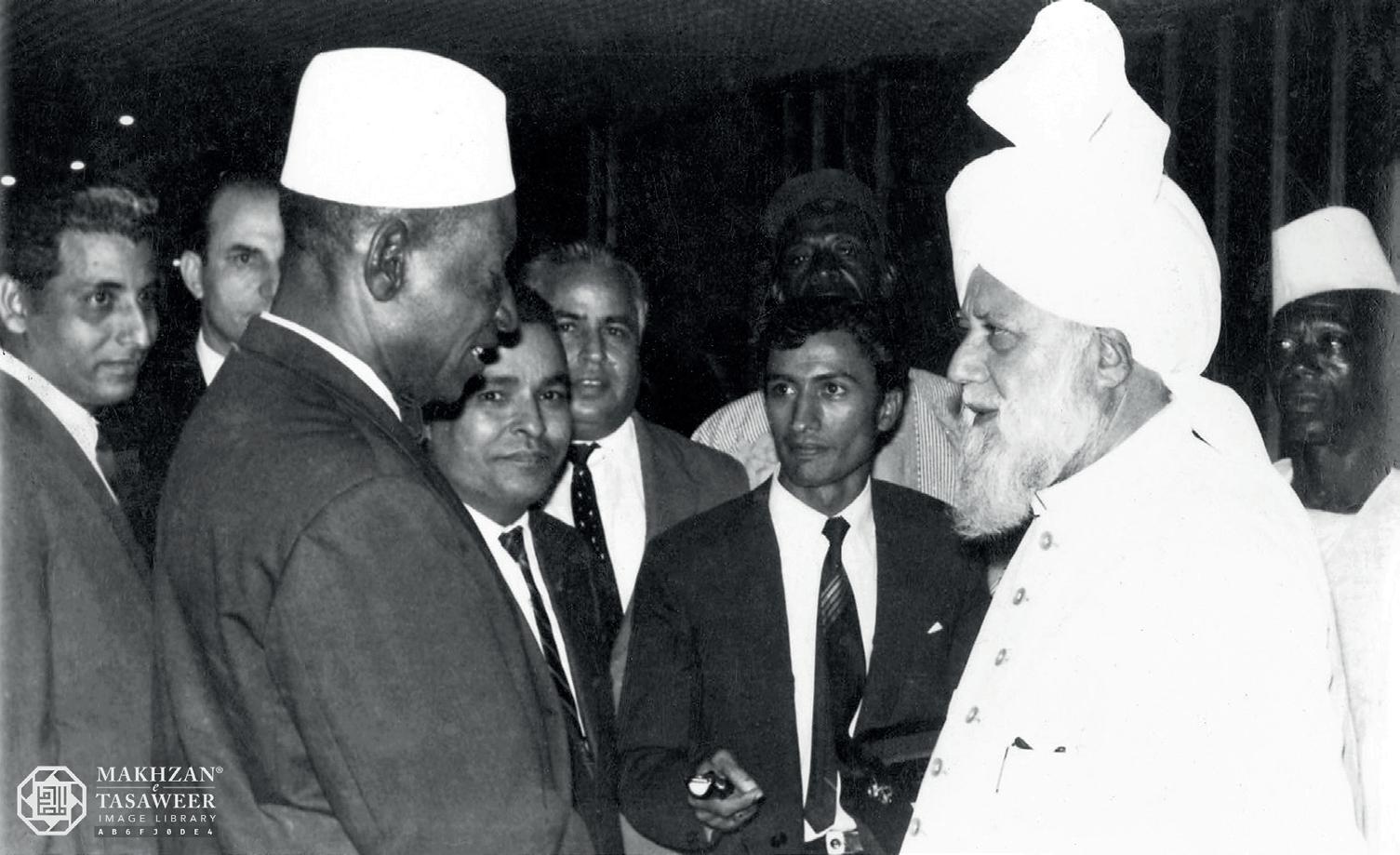
9 AL HAKAM | Friday 2 December 2022
F M Singateh (Governor General of The Gambia) meeting Hazrat Khalifatul Masih IIIrh at a reception in the Federal Palace Hotel in Lagos, Nigeria, April 1970
Was Jesusas born on 25 December?
Ata-ul-Haye Nasir Al Hakam
Whether or not 25 December is the actual date of birth of Jesusas is a highly debated issue. Both the Holy Quran and Bible (New Testament, Luke 2:7-8) imply that Jesusas was not born in winter and that it was a season in which the dates are ripe.
While mentioning the birth of Jesusas, the Holy Quran says that the angel asked Maryas:
“And shake towards thyself the trunk of the palm-tree; it will cause fresh ripe dates to fall upon thee.” (Surah Maryam, Ch.19: V. 26)
Commenting on this verse, Hazrat Musleh-e-Maud, Mirza Bashiruddin Mahmud Ahmadra said:
“Christian history implies that the Messiahas [of Nazareth] was born on 25 December. Luke states that Caesar Augustus had commanded to hold a census at the time, for which Joseph and Maryas travelled from Nazareth to Bethlehem, and this is where Jesusas was born, meaning that Jesusas
was born on 25 December in Bethlehem at the time when the first Jewish census was conducted under the command of Caesar Augustus [according to Luke, 2:1-6].
“However, the Holy Quran states that Jesusas was born in the season of the ripening of dates. December is not a time for the ripening of dates; rather, it is July and August. Moreover, we find that God Almighty told her [Maryas] about a stream of water as well, where she could give a bath to the [newly born] child and cleanse herself as well.
“From this, we come to know that it was the month of July or August, otherwise, it would have been unwise to take a bath herself and to give a bath to the child at the stream in such cold weather [of December], especially on a mountainous place in the North of Arabia.
“Nonetheless, Christian history asserts Jesusas was born in December, and even if we concurred with this for the sake of argument, then the issue would arise that the Holy Quran states [that the angel asked] Maryas:
“‘And shake towards thyself the trunk of the palm-tree; it will cause fresh ripe dates to fall upon thee.’ [Surah Maryam, Ch.19: V. 26]
“Thus, if it is true that Jesusas was born in December, then the question arises as to why the Quran mentioned dates, whereas dates do not mature in that season.
“In order to avoid this question, the commentators [of the Holy Quran] have written that Maryas went near the date palm in order to get support in her painful condition. The commentators wondered, ‘If the Christians assert that Jesusas was born in December, then why did Maryas go near the fruitless date palm, since it is very unlikely for dates to ripen in December?’ In response, they assumed she approached the date palm for support due to her painful condition.
“However, they did not contemplate that along with the words ‘And shake towards thyself the trunk of the palm-tree; it will cause fresh ripe dates to fall’ [19:26], the Holy Quran states [in the next verse]: یل�ف
“‘So eat’ [19:27].
“Just because they had in their minds the Christian belief about the birth of Jesusas in December and the fact that date palms do not ripe in that season, they interpreted she went near the fruitless date palm just for getting support in her painful condition. However, some commentators have pondered over the words اینج ابﻃر کیلع ﻂقﺴﺗ and یل�ف, and wrote that it was a miracle that upon shaking the infertile date palm, fresh dates fell upon her.
“The second point of concern is that this incident took place in Judea. The Holy Quran mentions the dates and Biblical history tells us that olives, almonds, and grapes were found in that area, but it does not mention dates. And strangely, December is not the season of almonds, grapes or olives. [...]

“Now, let’s see whether the date palms were found in the areas that are said by the Gospels to be Jesus’ place of birth. When we study the Bible in this regard, we find the Bible itself attests to the presence of date palms in that area. Hence, it states:
“‘The descendants of Moses’ father-inlaw, the Kenite, went up from the City of Palms with the people of Judah to live among the inhabitants of the Desert of Judah in the
Friday 2 December 2022 | AL HAKAM 10
اینج ابﻃر کیلع ﻂقﺴﺗ ۃلخنلا عذجب کیلا ىﺰﻫو
ابﻃر کیلع ﻂقﺴﺗ ۃلخنلا عذجب کیلا ىﺰﻫو
اینج
Bethlehem, circa 1894 | Wiki Commons
Negev near Arad.’ (Judges, 1:16)
“Arad – mentioned in this reference –is around 100 miles away from Bethlehem, and since the City of Palms was in its North, it suggests that date palms were certainly present around the area of Bethlehem. Moreover, since the area of Judea, in which Bethlehem is located, connects to Arabia, the presence of date palms is very much possible there.
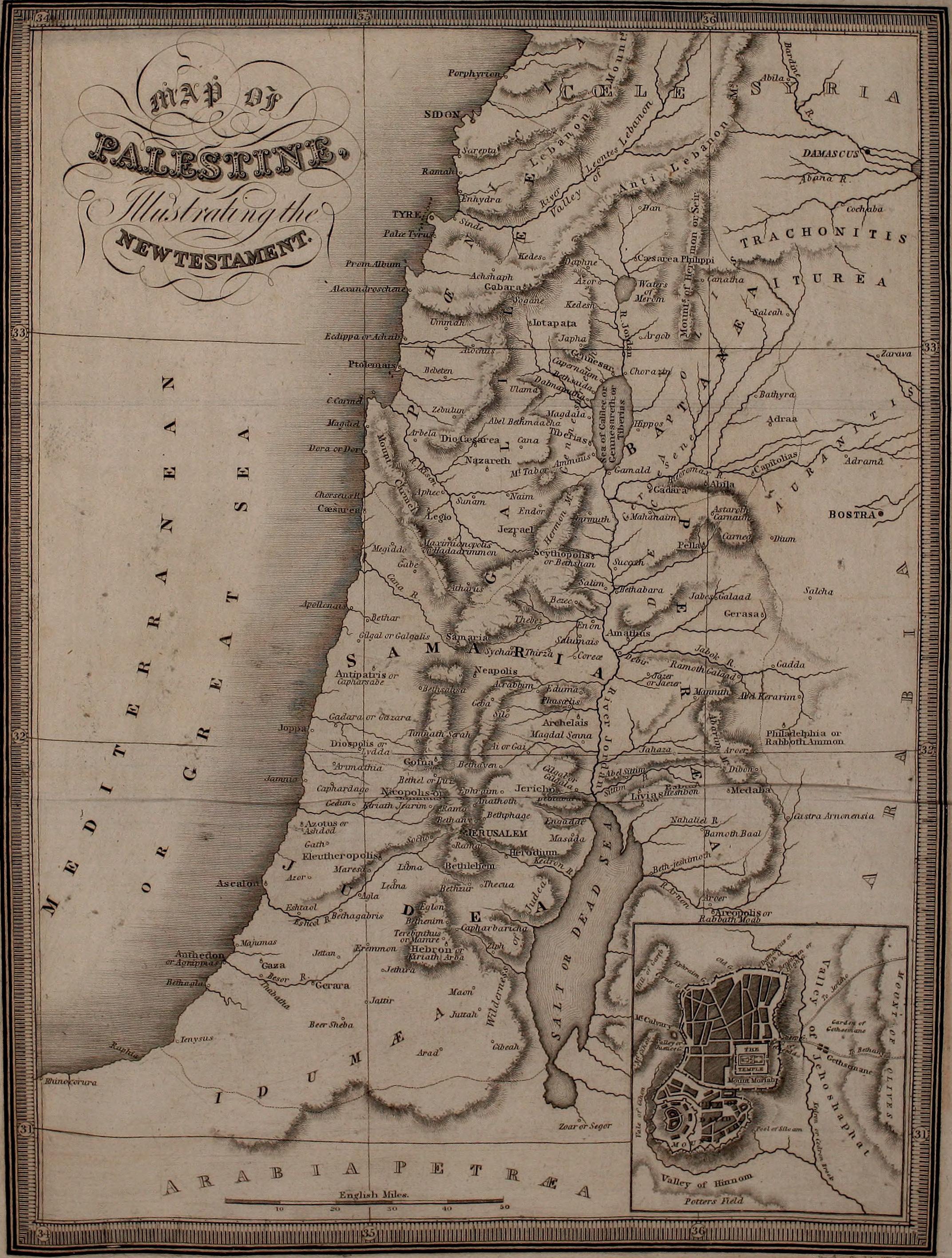
“From this research, the matter of کیلا ۃلخنلا عذجب has been solved that the date palms were found in that area. However, the question that still needs to be resolved is the Holy Quran states that at the time of the birth of Jesusas, it was the season when there were dates attached to the palm tree and were ripened and eatable as well. On the contrary, the Christians say Jesusas was born in December, which is not a season of dates.
“Therefore, it must mean that according to the Holy Quran, Jesusas was born in a season when there are [ripe] dates on palm trees. The Christian histories assert that Jesusas was born on 25 December, and some believe it to be in April, however, December and April both are not the peak seasons of dates. Hence, we require further research on this matter.” (Tafsir-e-Kabir, Vol. 5, pp. 179180)
Luke’s statement about the Census
While mentioning Luke’s statement about the census held under Caesar Augustus’ command, Hazrat Musleh-eMaudra said:
“This verse [Ch.19: V.26] of the Holy Quran compels us to ponder and to find out
the reason behind the contradiction between these two statements [the Quranic verse and Luke’s statement]. From this perspective, when we look into history, we find that Luke was mistaken about the census. He states that Joseph and Maryas went to Bethlehem from Nazareth for the purpose of the census, however, Roman history suggests there was no census conducted during the year of Jesus’ birth.
“[Titus Flavius] Josephus – the greatest historian during the time of Jesusas – writes that the first ever census was held in 7 AD. [...] He further states that it was such a new phenomenon for the Jews that it made them wonder what was the purpose of that census. If the census had already occurred seven years prior, then why would the Jews be amazed this time?
“Moreover, history also suggests that at the time of the death of Herod, Quinctilius Varus was the governor [of the Roman province of Syria], not [Publius Sulpicius] Quirinius, as stated by Luke. In addition, Roman history says that the preceding governors were Sentius Saturninus and Titius - the former held the position from 9 to 6 BC, and the latter is mentioned in the history in 10 BC. (Encyclopaedia Biblica, under the word ‘Chronology’). It means that there was no governor, namely Quirinius, between 10 BC and the death of Herod [in 4 BC]. [...]
“From this we can understand that Luke’s mind had mixed up the incidents. It is possible that, after hearing about the census, which was held years after [the birth of Jesusas], he misunderstood that it
had occurred earlier and Joseph had gone out for that. And then he [Luke] linked the incident of [Jesus’] birth with this. Or he had intentionally distorted the incidents, which is the reality in fact.” (Ibid, pp. 180-181)
The reference from the Encyclopaedia Biblica, which has been quoted by Huzoorra, states:
“Lk. [Luke] says (2:1-5) that Jesus was born at the time when a census, ordered by Augustus for the whole empire, was being taken in Judea and Galilee, and that this was while Cyrenius (undoubtedly Publius Sulpicius Quirinius) was governor in Syria. Such a census, however, was legally impossible in the reign of Herod, and a governorship of Quirinius in Syria before Herod’s death is chronologically impossible, since at the time of Herod’s death (4 B.C.) Quinctilius Varus (who put down the insurrection following that event) was still governor in Syria, whilst his predecessors were Sentius Saturninus (9-6 B.C.) and Titius (attested for 10 B.C.). Josephus, who relates the last years of Herod in much detail, has no knowledge of such a census, but says that the census of 7 A.D. was the first, and something altogether novel for the Jews. [...]
“The account in Lk. [Luke] rests, therefore, on a series of mistakes, and the most plausible view is that the evangelist, or the tradition which he followed, for some reason combined the birth of Jesus with the census under Quirinius, and assigned to the latter a wrong date.” (Encyclopaedia Biblica, Vol. 1, under the word ‘Chronology’, London, 1899)
While speaking about the reason which compelled Luke to link the census of 7 AD to the birth of Jesusas, Huzoorra said that he felt a desperate need to present an excuse to explain why Joseph and Maryas undertook such a long journey to Bethlehem.
Huzoorra said that when Maryas became pregnant without a husband, Joseph was told in a dream that he should bring her to his home since she was speaking the truth about her chastity. Though Joseph was convinced, they had a fear that people would not believe this and would malign the pure character of Maryas. For this reason, when the pregnancy became apparent, they decided to move to a distant place and Maryas gave birth to the child.
While shedding light on the difficulty faced by Luke in narrating the abovementioned occurrences, Huzoorra said that Luke - in addition to stating that the angel told Maryas “you will conceive in your womb and bear a son, and you shall name him Jesus” - also stated that the “miracles” began to manifest from the time of Mary’sas conception:
“During those days, Mary set out and travelled to the hill country in haste to a town in Judah, where she entered the house of Zechariah and greeted Elizabeth. When Elizabeth heard Mary’s greeting, the infant leaped in her womb, and Elizabeth, filled with the holy Spirit, cried out in a loud voice and said, ‘Most blessed are you among women, and blessed is the fruit of your womb. And how does this happen to me, that the mother of my Lord should come to me? For at the moment the sound of your greeting reached my ears, the infant in my womb leaped for joy. Blessed are you who believed that what was spoken to you by the Lord would be fulfilled.’” (Luke, 1:40-45)
Huzoorra elaborated that if the “miracles” had begun at that time, and the “divinity” of the child was so apparent, then there was no need to hide it and move to a distant place:
“Luke had intended to prove the ‘divinity’ of Jesus, and thus, he narrated that ‘miracles’ of Jesus had begun since the time of Mary’s conception. [...] Luke thought that if it were proved that Maryas had migrated due to her pregnancy, it would be asserted that despite witnessing such ‘signs’ and ‘miracles’ of Allah the Almighty, Mary and her husband Joseph had feared the people’s objections. On the other hand, Luke could also not deny the fact that Joseph and Maryas had migrated. [...]
“In order to avoid this objection, he narrates that the census was held during the year of birth - which was actually conducted in 7 AD - in order to justify the migration of Joseph and Maryas.” (Tafsir-e-Kabir, Vol. 5, p. 182)
The Luke’s statement about shepherds
Hazrat Musleh-e-Maudra further states:
“While narrating about the birth of Jesusas, it is stated in one of the gospels:
“‘Now there were shepherds in that region, living in the fields and keeping the night watch over their flock.’ (Luke, 2:8)
“Obviously, it was the summer, instead of the extreme winter. The weather in Palestine in December is not only very cold but also extremely rainy and foggy. Who can accept that in such weather the shepherds had come out in the fields along with their flock? It is clear that it was summer.
“Therefore, in the Peake’s Commentary on the Bible, while commenting on Luke’s statement [Luke, 2:8], Principal A J Grieve M.A.D states that it could not be the month of December, and that the tradition of Christmas Day — which was initially found in the West — had begun some time later.
“In his book The Rise of Christianity, Bishop [of Birmingham, Ernest William] Barnes writes:
“‘There is, moreover, no authority for the belief that December 25 was the actual birthday of Jesus. If we can give any credence to the birth-story of Luke, with the shepherds keeping watch by night in the fields near Bethlehem, the birth of Jesus did not take place in winter, when the night temperature is so low in the hill country of Judaea that snow is not uncommon. After much argument, our Christmas Day seems to have been accepted about AD 300.’ (The Rise of Christianity, Great Britain, 1948, p. 79)
“Therefore, in light of these references, it is evident that the birth of Jesusas did not occur in December. [...]
“It is possible that the census of 7 AD took place in December, and in an attempt to take advantage of this, Luke linked it to the year of birth. Obviously, Luke had written the book 70-80 years later, thus, who could have remembered as to when exactly the census happened?
“From this commentary [...] which is also supported by the incidents from Roman history and the gospel traditions, the reason behind the Holy Quran’s mentioning the incident of ripened dates, becomes very clear.” (Tafsir-e-Kabir, Vol. 5, pp. 184-186)
AL HAKAM | Friday 2 December 2022 11
A map of Palestine, illustrating the New Testament, circa 1833 | Flickr
100 Years Ago...
Madras High Court rules in favour of Ahmadis: Hazrat Maulvi Sher Ali explains
The Review of Religions [English], December 1922
 Hazrat Maulvi Sher Ali Sahibra (18751947)
Hazrat Maulvi Sher Ali Sahibra (18751947)
To The Editor, The Review of Religions, Qadian.
Dear Sir,
The Hindu of Madras, in its issue of 7 September 1922, publishes a letter under the heading “The Ahmadiyya Community” from one who signs himself [as] SAB. In this letter, Mr SAB protests against a judgement recently delivered by the Honourable Judges of the Madras High Court in a criminal revision petition against a decision of the Sessions Judge of North Malabar.
The origin of the case lies in the fact that the Ahmadiyya Community, owing to their belief that the prophecy of the Holy Prophet, may peace and the blessings of God be upon him, regarding the advent of a Messiah and Mahdi has been fulfilled in the person of Hazrat Mirza Ghulam Ahmad[as] of Qadian, is persecuted all over India. The persecution began as soon as Hazrat Mirza Sahib[as] started his [preaching] and has been taking various forms in India.
It took on a novel form recently in Malabar, where the persecution of the Ahmadis had already existed for many years. Certain maulvis [clerics], it appears, declared that a person professing the Islamic faith who joined the Ahmadiyya Movement turned an apostate and his marital tie was therefore automatically dissolved. The result was that the persecutors of Ahmadis gave a new turn to their persecution of the Ahmadiyya Community. The wife of a certain member of the Community was abducted and married to a non-Ahmadi without a divorce being obtained from the Ahmadi husband. The aggrieved husband instituted prosecution under Section 494 IPC against the woman, her new husband and three others. But the Sessions Judge who was a Hindu gentleman, being not well-informed about the true character of the Ahmadiyya Movement held that the complainant had by becoming an Ahmadi become an apostate from Islam and his marriage had therefore been dissolved. On this view of the case, he acquitted all the accused. A revision petition was therefore preferred to the Madras High Court and God be thanked that the learned judges of the High Court have set aside the Sessions Judge’s decision, and have held that Ahmadis are a reformed sect of [Muslims] in that they subscribe to the Holy Quran and that it is unjustifiable to hold that they are apostates.
If God had not directed the learned judges to this equitable decision and if they had upheld the decision of the Sessions Judge, the lot of the Ahmadiyya Community would have become intolerable. In this new move of theirs, the persecutors had only
made a beginning and if they had succeeded in it, the Ahmadis would have been put through indescribable troubles.
Mr SAB, I am sorry to note, seems to be a sympathiser of the persecutors of the Ahmadis. He evidently wished that the decision of Sessions Judge Malabar had been maintained so that the non-Ahmadi persecutors of the Ahmadiyya Community might have been free to marry the wives of Ahmadis.
Whether such a course would be fair, I leave it to his conscience to decide.
His letter contains many misleading statements that are calculated to give a wrong impression about the nature of the Movement and I crave the hospitality of your pages for a refutation of the same.
The most serious imputation which he brings against the Ahmadis is that they are more the followers of Ahmad[as] than of Muhammad, may peace and blessings of God be upon him, whom they admit as prophet just as an ordinary [Muslim] would with regard to Moses[as] and Jesus[as], that they give precedence to the sayings and doings of Ahmad[as] over those of Muhammad[sa], and that they have established a new creed with Ahmad[as] as their head.
Nothing is further from the truth. It has been alleged that our attitude toward the Holy Prophet, may peace and blessings of God be upon him, is similar to the attitude of ordinary [Muslims] towards previous prophets such as Moses[as] and Jesus[as], whom the Muslims look upon as prophets
but whose books they are not bound to follow, the Holy Quran having dispensed with such need. To say that we also hold a similar attitude towards the Holy Prophet, may peace and blessings of God be upon him, is a libel. Our Book, which we follow, is the Holy Quran and the religion that we profess is Islam. We believe in Ahmad[as] as the Promised Messiah and Mahdi because the predictions of the Holy Prophet[sa] concerning the Promised Messiah and Mahdi have been fulfilled in him and all the criteria laid down in the Holy Quran testify to his truth. In other words, we have believed in him because we believed in the Holy Prophet[sa] and in the Quran. He has brought no new book and has taught no new religion. He was raised in fulfilment of the prophecies to establish the truth of Islam and of the Holy Prophet[sa], by heavenly signs and by means of cogent arguments. He was a servant of Islam and a devoted servant and ardent lover of the Holy Prophet[sa]. To establish the truth of Islam was the one aim of his life. God showed signs through him not only to establish the truth of his claims but also to demonstrate the truth of Islam and to show that Islam was now the only living religion in the world – a religion that could produce men like Ahmad[as]. In order to show what our creed consists of, I can do nothing better than quote the words of Ahmad[as] himself.
In the [book, The Age of Peace] Ayyamus Sulh (pp. 86-87), he wrote: “The five things on which Islam is based
is our creed. Beware that the curse of God falls on those who lie and who are guilty of imposture.”
With regard to divine revelation (wahy and ilham) we believe that they have not been discontinued after the Holy Prophet, may peace and blessings of God be on him. God still speaks as He used to speak to His religious servants among former peoples. God is not deprived of any of His attributes. He sees now as He saw in the past; He hears now as He heard in the past and He speaks as He spoke in the past. But as Islam is now the only true religion, all other religions being dead, therefore this favour of God is now confined to the holy and righteous followers of Islam. Ahmad[as] always referred to this fact as a proof of the fact that Islam was now the only living religion, by following which one could attain to all those blessings which were showered on holy men among former peoples and he continually emphasised the fact that this favour was now confined to Islam to the exclusion of all other religions, as a token of the fact that now the only true religion with God was Islam. He referred to his personality as a living proof of the fact that Islam was now the only religion by following which one could attain to all those blessings that had been bestowed on the holy men of the past ages.
These revelations, however, bring no new commandments, and abrogate no law of Islam. The Holy Quran is the final law, and the completest law; it is now the only book for all times and for all nations.
Friday 2 December 2022 | AL HAKAM 12
Ahmadi Muslims of UK; Hazrat Maulvi Sher Alira is seated above, wearing a light-coloured turban.
Islam is the final and the universal religion, a religion that will last to the end of time. But the door of revelation is not closed to the true followers of Islam. God still speaks to His righteous servants from among the true followers of Islam and reveals to them hidden things of the future. That has always been one of his choicest blessings, which he has been conferring on His righteous servants among former peoples and He has not withheld this favour of His from the true followers of Islam. If He had done so, that would have been disfavour; but there is no favour which He has withheld from the holy followers of His beloved Prophet Muhammad, may peace and the blessings of God be upon him. The righteous servants of the Holy Prophet[sa] have ever been enjoying divine communion and one who was destined to appear as the Promised Messiah enjoyed this communion in an exceptionally high measure.
It was for this reason that the Holy Prophet, may peace and the blessings of God be upon him, called him Nabiyullah (a Prophet of God). There is a great misunderstanding about the word Prophet which the Promised Messiah[as] applied to himself in conformity with the prophecy of the Holy Prophet[sa]. In order to give the reader a true idea of the nature of the prophethood which Ahmad[as] claimed for himself, I will again quote his own words. In a letter to the Akhbar-e-Aam of Lahore, dated 6 May 1908, he thus explained his claims:
“I have been always telling the people through my writings and now again declare that the charge which is brought against me that I, as it were, lay claim to a prophethood which cuts off my connection with Islam and which means that I look upon myself as an independent prophet so that I have no need to follow the Holy Quran and institute a separate creed and a separate qibla and hold the shariah of Islam as abrogated and exclude myself from the followers of the Holy Prophet, may peace and the blessings of God be upon him, is untrue. Nay, I look upon such a claim as kufr [disbelief]. Not only now but ever in my writings I have been declaring that I lay no claim to such prophethood and the charge against me is a calumny. The basis on which I call myself a prophet is only this that I am honoured by the communion of God, that He frequently speaks to me many hidden things and discloses to me such secrets of the future as He never discloses to anyone unless he enjoys special nearness to Him. […] But I am not a prophet in the sense that I, as it were, separate myself from Islam or abrogate any commandment of Islam. My neck is under the yoke that Islam lays on us and no one has the power to abrogate even a jot or tittle of the Holy Quran. So, I call myself Nabi (prophet) only because in Arabic and Hebrew nabi means one who, being inspired by God, announces prophecies in a very large number. […] Seeing that generally men have visions and some receive inspiration also, but that inspiration is meagre in quantity and contains very few secrets of the future and besides being meagre, it is also doubtful and confused, therefore reason demands that he whose revelation and whose prophecies are free from such defects should not be classed with other ordinary men, but should be called by a special name, so that he may be
distinguished from others. Hence, only in order to give me a distinguished position, God has called me Nabi and this is a title of honour that has been conferred on me so that there may be a distinction between me and others. In this sense, I am both a Nabi and an Ummati (a follower of the Holy Prophet, may peace and blessings of God be upon him.)”
I may point out here that our views about the continuation of revelation after the Holy Prophet, may peace and the blessings of God be upon him, and about prophethood are corroborated by many eminent authorities in Islam.
Mr SAB lays great emphasis on the opinion of the ulema and takes the judges of the Madras High Court to task for disposing of such an important case “without so much as consulting a [Muslim] maulvi or a jurist on the point” and accuses them of “trampling underfoot the weighty opinion held by Muslims throughout ever since the Ahmadiyya Movement was started.”
Mr SAB does not explain the maulvi of which sect the High Court Judges ought to have consulted on this point. There is no sect of Muslims in India that is not held to be a kafir [disbeliever] by one sect or the other and consequently there is no such maulvi whose views may be admitted as authoritative by all sects of [Muslims]. The [Muslims] of India comprise four principal sects, viz, the Shias and three divisions of the Ahl-e-Sunnat, the Hanafites, the Ahle-Hadith, and the Muslims of the Aligarh School who are influenced by the views of Sir Syed Ahmad Khan. But there is not one sect among them whose Islam the followers of other sects agree on. Not only this, but even the sub-divisions of these sects declare one another to be kafirs
Is Mr SAB, who seems to be such a great admirer of the learned maulvis and who attached too much weight to their learned opinion, aware of the fatwa which the maulvis pronounced against Sir Syed Ahmad Khan? If he is not aware of this fact, let him study the Hayat-e-Javed, the well-known biography of Sir Syed written by Hali. From it, he will learn that not only the learned maulvis of Deoband, Ambala, Saharanpur, Delhi, Lucknow and the Punjab declared him and his followers to be apostates and kafir but even the learned ulema of Arabia participated in this “holy work” and the jurists of all the four schools (the Hanafites, the Hanbalites, the Shafites and the Malikites) at Mecca and Medina joined in pronouncing the same verdict. The following sentence from the Hayat-e-Javed may interest Mr SAB:
“These fatwas bear the seals and signatures of both the well-known and littleknown maulvis of all the [Muslim] sects in India, whether Sunnis or Shias, Muqallid or Ghair-Muqallid, Wahabis or Bid‘atis.”
This is enough to show that the fatwas of the maulvis are not proof of one’s being a kafir or an apostate.
There are numerous instances in which the learned ulema of one generation declared a person to be a kafir or murtad [apostate], but subsequent generations adored that very man as a saint. Again, Mr SAB is not right when he says that the learned judges of the High Court disposed of the case without so much as consulting even a single Maulvi; for they had before them the verdicts of all the leading non-Ahmadi maulvis and jurists
of Malabar and the “weighty” opinion of the Qazi of Madras, but the learned judges of the High Court accorded them the treatment they deserved and set them aside as misguided and erroneous.
One point more and I bring my reply to Mr SAB’s letter to an end. He finds fault with the Ahmadis for not saying their prayers behind a non-Ahmadi Imam and for not giving their daughters in marriage to nonAhmadis. This criticism is not justifiable. He must remember that we believe Ahmad[as] to be the Promised Messiah whose advent is accepted by the whole Muslim world and before finding fault with us for this or that action of ours, he should enquire of his own maulvis, whether, when the Promised Messiah[as] comes, it will be lawful for the believers of the Promised Messiah[as] to maintain such relations with those who will deny him. If the maulvis and the jurists declare that it will be lawful to say prayers behind such imams as will deny the Promised Messiah[as] and to give daughters in marriage to those who will reject him, then, of course, Mr SAB may be regarded as justified in calling us to account for not maintaining such relations with the deniers
of him whom we believe to be the Promised Messiah[as]. But if they declare that it will not be lawful to maintain such relations with the deniers of the Promised Messiah[as], then he has no ground for finding fault with us for our present attitude. If in spite of our belief that Ahmad[as] is the Promised Messiah, we maintain such relations with the deniers of Ahmad[as], we shall not be true to our professions. Under the present circumstances, we should have been open to objection if we had continued such relations with the non-Ahmadis. As matters stand, we are only doing what we ought to have done consistently with our beliefs.
Hence, instead of levelling such criticisms against us, the proper course for Mr SAB was to inquire whether Ahmad[as] of Qadian is the Promised Messiah or not. If he is, as we firmly believe him to be, then all these questions are solved of themselves when we take into consideration the important character of his claims.
Yours sincerely, Sher Ali.
(Transcribed by Al Hakam from the original, published in The Review of Religions, December 1922)
Jamaat-e-Ahmadiyya Bulgaria’s humanitarian efforts
Anton Mihaylov Abdullah Missionary, Bulgaria
Jamaat-e-Ahmadiyya Bulgaria had the opportunity to help schools and pupils, including Ukrainian children, by providing them with school materials and other essentials for the start of the school period. A TV, and a printer were donated in cooperation with Humanity First Germany.
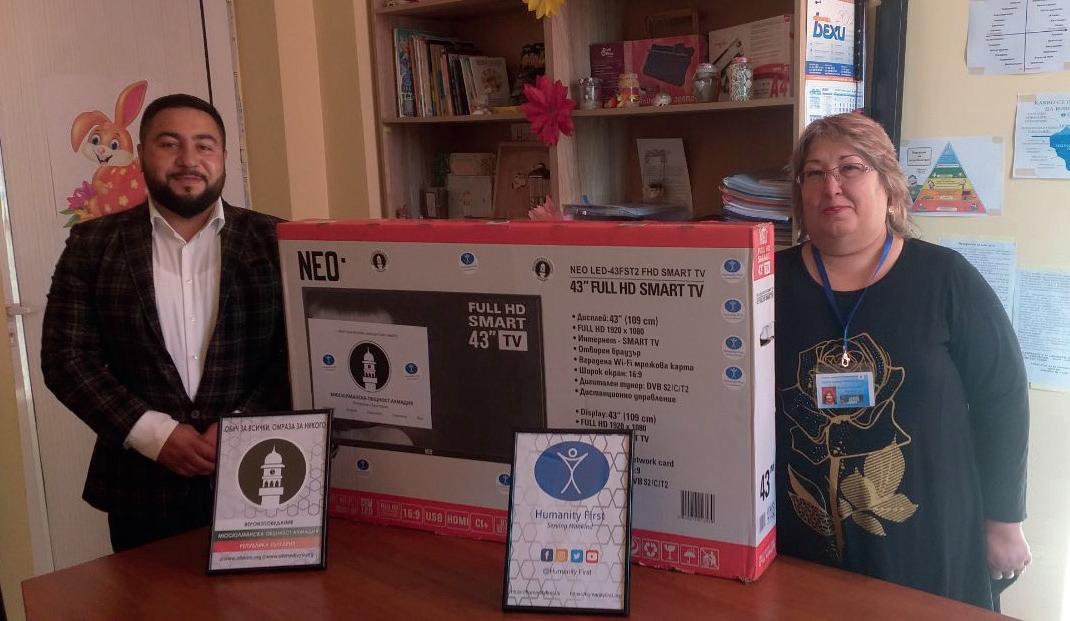
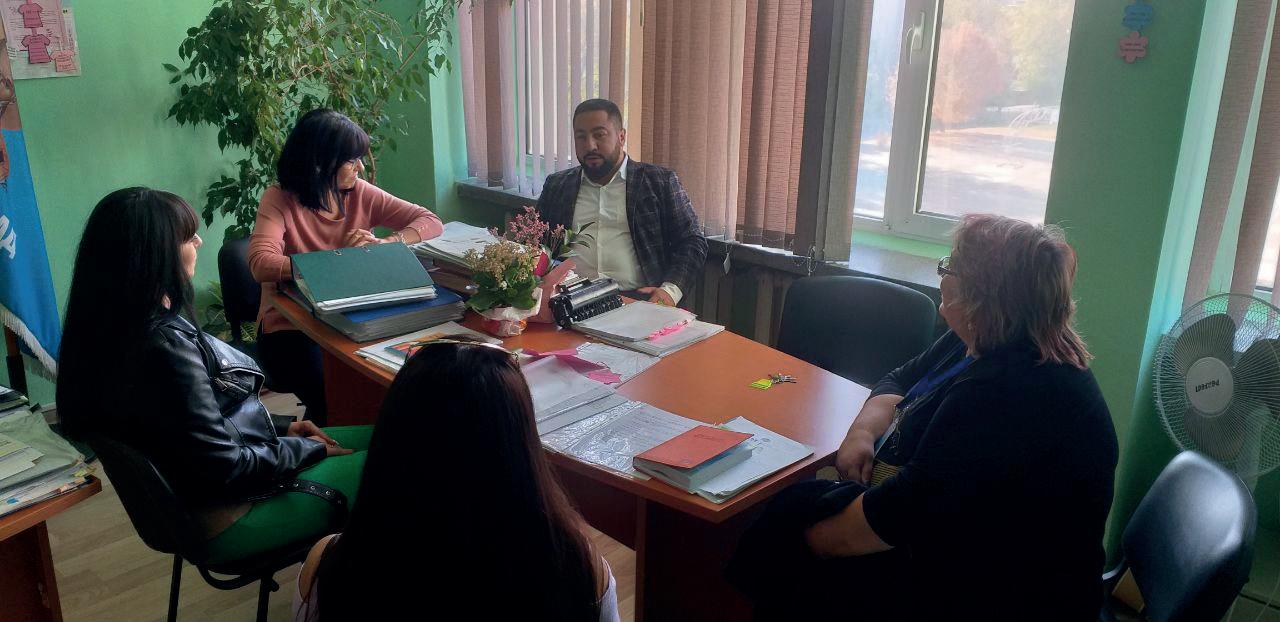
This donation was the first of its kind in the city of Simeonovgrad. Donations were made to three schools and one social services centre.
Further donations were made in the district of Blagoevgrad to Ukrainian refugee children and the humanitarian warehouse in Sandanski.
Several head teachers shared their feelings and appreciation as follows:
“It is difficult for us to describe in words our appreciation for your generosity and support.”
“We hope and wish that your community stays safe and that others learn from your kindness.”
“With your donations, you contribute to the education of students who do not have the opportunity to provide themselves with the necessary supplies.”
AL HAKAM | Friday 2 December 2022 13
Munafiqeen: How to identify and deal with hypocrisy - Part 2
Rizwan Khan Connecticut, USA
Those who believe but befriend hypocrites
Then there are those who are believers but they are friends with munafiqeen (hypocrites): Allah Almighty says:
“If the hypocrites, and those in whose hearts is a disease, and those who cause agitation in the city, desist not, We shall surely make thee take action against them.” (Surah al-Mu’minun, Ch.33: V.61)
This verse describes all of the types of munafiqeen described thus far. “The hypocrites” disbelieve in their hearts but claim to believe. “Those in whose hearts is a disease” mix faith and hypocrisy in their hearts. “Those who cause agitation in the city” are believers who are friends with hypocrites.
Allah Almighty speaks of the friends of hypocrites:
“And there are among you those who would listen to them [i.e. the munafiqeen]. And Allah well knows the wrongdoers.” (Surah at-Taubah, Ch.9: V.47)
Hazrat Musleh-e-Maudra described the characteristics of the friends of hypocrites:
“They spread the objections of munafiqeen. A munafiq says that the Jamaat is ruined, and like a parrot, he repeats this sentence, and, wherever he goes, he says that the Jamaat is ruined. He is a believer but he is a foolish and ignorant believer; a believer who is a tool of munafiqeen.” (Khutbat-eMahmud, 5 August 1938, pp. 501)
These people serve a unique purpose for the munafiqeen as when they spread discord, they are sometimes not effective because the believers know they are munafiqeen, so believers dismiss what they have to say because creating discord is their habit. However, when these naïve believers who are friends of hypocrites, blindly repeat the same objections, then the munafiqeen use them to add legitimacy to their claims. They point to them and say their propaganda must be true because these sincere believers are repeating it. They hide behind these foolish and ignorant believers and use them as a tool.
Hazrat Musleh-e-Maudra said, “This is what a munafiq does, they ‘whisper into the hearts of men,’ (Surah an-Nas, Ch.114: V.6) they put evil suggestions in people’s hearts and then back away.” (Khutbat-e-Mahmud, 5 August 1938, p. 501)
These friends of the hypocrites are people who really believe they are sincere, they have rationalised their actions and convinced themselves that they were only trying to promote peace. However, their actions are hypocritical. The munafiqeen
take advantage of how naive they are. If these believers don’t reform themselves, they may meet the same fate as the munafiqeen Hazrat Musleh-e-Maudra said:
“Even if they do not become munafiqeen, sometimes they receive the punishment of munafiqeen from Allah Almighty because He says,
‘And incline not toward those who do wrong, lest the Fire touch you.’ (Surah Hud, Ch.11: V.114)
“This verse tells us that those who are not wrongdoers [zalim], sometimes fall into hell because of their friendship with those who are wrongdoers. Thus, this category of munafiqeen is not a munafiq in their faith, but friendship with munafiqeen is their habit and their recognition, and so they are counted as a category of munafiqeen.” (Khutbat-e-Mahmud, 5 August 1938, pp. 501)
This type of behaviour existed during the time of the Holy Prophetsa. The Holy Quran describes the rumours the munafiqeen spread against Hazrat Aishara and how they used that to spread dissension against the Holy Prophetsa. Some otherwise sincere believers made the grave mistake of repeating these rumours started by the munafiqeen. From this story, the consequences of being friends with munafiqeen become clear.
It is no small mistake to choose to be friends and helpers of those whom Allah Almighty describes as surely being in the lowest depths of the Fire.
“They are helpers of those wrongdoers about whom God Almighty has said they will be thrown into the lowest depth of the Fire.” (Khutbat-e-Mahmud, 5 August 1938, pp. 504-505)
We must separate ourselves from munafiqeen Why does the fire touch those who warmly incline to the wrongdoers? The answer to this question lies in how they became friends with the munafiqeen in the first place.
Munafiqeen fearfully tests the waters to see who is with them. They’ll say something against the Khalifa in a way that can have
two meanings, so they have plausible deniability in case we call them out for their hypocrisy. They speak sarcastically and then decide afterwards based on our reaction whether they were joking or not. This type of underhanded behaviour is obnoxious to any believer or disbeliever with self-respect. The Quran says:
“And thou shalt surely recognize them by the tone of their speech.” (Surah Muhammad, Ch.47: V.31)
“A hypocrite faces both ways. He never talks straight and always indulges in ambiguous and equivocal speech so that it conveys one sense to one person and quite another sense to another person.” (English Five Volume Commentary of Surah Muhammad, Ch.47: V.31)
“A hypocrite is a double-faced person who generally uses language susceptible of double meaning. This he does to extricate himself from an awkward position, wherein, should one construction of his speech land him in trouble, he might be able to avoid that consequence by putting quite a different construction on it.” (English Five Volume Commentary of Surah Muhammad, Ch.47: V.11)
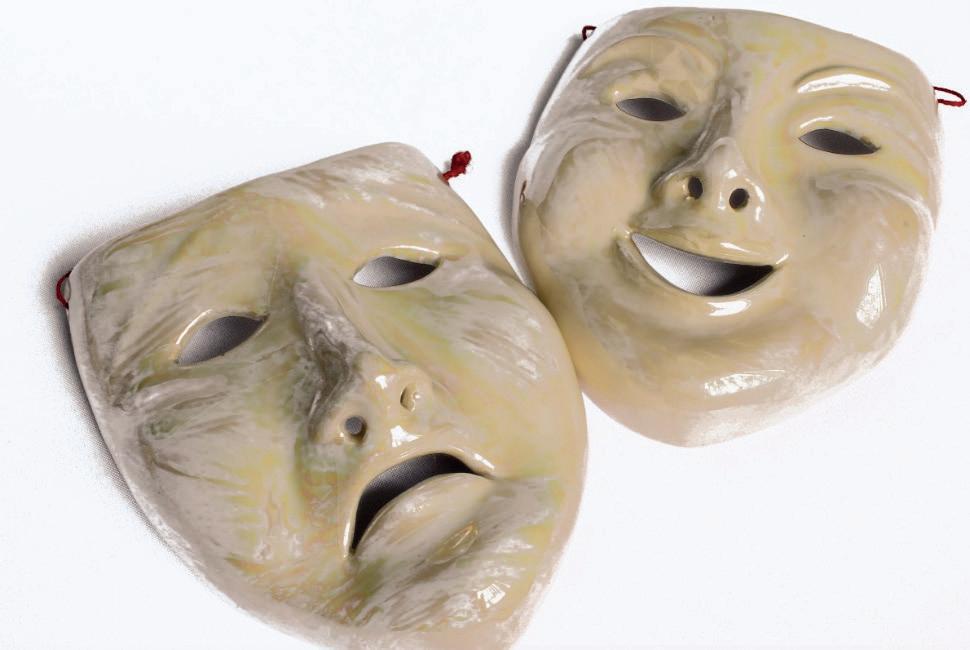
If you call them out on their hypocrisy, they will say they were only joking. Allah Almighty describes this behavior of the munafiqeen in the Holy Quran:
“And if thou question them, they will most surely say, ‘We were only talking idly and jesting.’ Say, ‘Was it Allah and His Signs and His Messenger that you mocked at?” (Surah at-Taubah, Ch.9: V.65)
They check our reaction to see if we have respect for Allah and His signs and His Khalifa and His Jamaat, or if we’re actually like them. They can find one another because they can recognise the underhanded and hypocritical nature of people like them. They have an affinity with one another. Allah Almighty describes in the Holy Quran that they are interconnected
with one another and are similar.
“The hypocrites, men and women, are [all] connected one with another.” (Surah atTaubah, Ch.9: V.67)
Those who have an affinity with them, start to join their sittings and gradually become more and more like them. It is no small mistake to prefer the munafiqeen as friends over sincere believers.
If we join their sittings and tolerate disrespect of Allah and His signs and His Khalifa, we lose our sense of respect and gradually become like them. Allah Almighty says:
“[…] when you hear the Signs of Allah being denied and mocked at, sit not with them until they engage in a talk other than that; for in that case you would be like them. Surely, Allah will assemble the hypocrites and the disbelievers in Hell, all together;” (Surah an-Nisa, Ch.4: V.141)
Hazrat Musleh-e-Maudra explained it is extremely important to cut the roots of munafiqat, otherwise, the promise of Khilafat will come into jeopardy.
He quoted that Hazrat Uthmanra said, “‘You let people who spread disorder come into your homes and you converse with them. As a result, these people have become bold. The result of this negligence of yours is that the blessings of Khilafat will come to an end and the unity of Muslims will be left scattered.’ Now look, what Hazrat Uthmanra said is what happened.’” (Anwar-ul-Ulum, Vol. 25, pp. 415-416)
Hazrat Musleh-e-Maudra said:
“If you wish to stand in support of the munafiqeen and to protect them, then I ask you whether you would be willing to keep a rat that had died of plague in your house, then I will understand that you are honest.” (Khutbat-e-Mahmud, 16 October 1936, pp. 681)
This analogy is fitting because, as was mentioned before, the root meaning of this word includes the meaning of a hole in the earth having two open ends that the rat enters, concealing one end and leaving the other exposed. We care for our physical health, so if we found a rat that had died of plague in our house, we would immediately throw it out because we don’t want the disease to spread in our house. When we care for our spiritual health, then if we find a munafiq, we should do the same to save ourselves from their disease.
Hazrat Musleh-e-Maudra said: “Those who keep meeting with munafiqeen because they are relatives or loved ones, I give them a conclusive argument after which they are responsible, and I tell them they will certainly be seized by
Friday 2 December 2022 | AL HAKAM 14 Continued on next page >>
نوفجﺮملاو ضﺮم مہبولﻗ یف نیذلاو نوقفنملا ﻪتنی مل ن�ل مہب کنیﺮغنل ۃنیﺪملا یف
میلع ہللاو
��ملﻈلاب
ؕ مہل نوعمس مکیفو
رانلا مکﺴمتف اوملﻇ نیذلا یلا اونکﺮﺗ الو
لوقلا نﺤل یف مہنفﺮعتلو
ہللابا لﻗ ؕ ﺐعلنو ضوخن انک امنا نلوقیل مہتلاس ن�لو نوءﺰہتﺴﺗ متنک ﻪِلوسرو ﻪتیاو
ﺾع� نم مہضع� تقفنملاو نوقفنملا
مہعم اوﺪعق� ا�ف اہب اﺰہتﺴیو اہب ��کی ہللا تیا متعمس اذا ہللا نا ؕ مہلثم اذا مکنا � ه��ﻏ ﺚیﺪح یف اوضوخی یتح اعیمج منہج یف نی��کلاو ��قفنملا عماج
OpinionWere the Indigenous Australians warned against ‘waking the nuclear dragon’?
Nasir Student at The University of Sydney
In Kakadu, Northern Australia, the physicist Dr Derek Muller faces the camera and tells his viewers of his documentary that “this ancient land is home to the Indigenous Australians, the oldest continuous culture on Earth.” He goes on to say, those Indigenous Australians believed that at the time of creation, a spirit being, a great reptile, had gone underground, where it still slept and must not be disturbed.
His documentary, Uranium – Twisting
the Dragon’s Tail, is a science documentary on uranium and how its use in nuclear energy and nuclear weaponry makes it a powerful element (https://ihavenotv.com/ part-1-uranium-twisting-the-dragons-tail). Dr Muller then continues to say that “now, we know that beneath this [Australian] soil lie some of the richest deposits of uranium anywhere on Earth. And uranium is like a sleeping dragon. It’s a beast of mythical power. Now, the traditional owners of this land say that if you disturb this place, you will awaken that sleeping spirit and unleash disaster.”
While the documentary is strictly
scientific, the Indigenous mythology of a sleeping dragon that should not be awoken could not be more of an accurate indicator of the state of the world today. The war in Ukraine has demonstrated that deploying nuclear weapons is entirely possible and plausible, and the consequences would be beyond our imagination.
In my view, it could also be a possible indication that the Indigenous people, who up until colonisation in the late 1700s, stayed mostly to themselves for around 60,000 years ( https://aiatsis.gov.au/explore/australiasfirst-peoples), may have been vouchsaved some wisdom and warned against mining the land and thereby, awakening the dragon, which we now understand could refer to uranium. Could it also be an indicator of their belief in spirituality and creation and that God’s message had reached all civilisations no matter how remote they are or how far back into the past they go?

In his book, Revelation, Rationality, Knowledge and Truth, Hazrat Khalifatul Masih IVrh dedicates an entire section to Australia’s Indigenous people, saying they believe in a Supreme Being and that the colonial Christian British observers who described Indigenous beliefs as primitive did so out of their ego and prejudice. Revelation, Rationality, Knowledge and Truth reads: “[…] the simple question which any
[colonial] sociologist must have addressed was: how could a primitive society, like that of the Aborigines, which was split into hundreds of sub-tribes with no means of communication among them, conceive the same idea of One Supreme Eternal Being independently?” Huzoorrh observed their belief in “High Gods”, synonymous with Allah or God, is eternal and everlasting and that such beliefs existed well before the arrival of Christian missionaries in the late 1700s and 1800s. He also clarified that the term “High Gods” was singular but was pluralised in Indigenous terminology out of respect for the high status of God. This demonstrates that Indigenous Australians have received Divine revelation and that God has guided their civilisation, which makes logical sense given they have been around for about 60,000 years. (www. alislam.org/library/books/revelation/part_3_ section_2.html)
So, while the world edges ever closer to nuclear war, could it be possible that Australia’s Indigenous people received Divine warnings thousands of years ago about the unearthing of this “dragon”? Whatever the case, if the rest of the world does not pay heed now and mitigate the risks of an all-out nuclear war, we will suffer the ultimate consequence and the “dragon” will unleash its wrath.
God. You are making God and His religion into a toy and are making light of it, but your cunningness and arrogance will not help you at all in front of God. Whoever encourages munafiqeen with his actions and conduct, should listen clearly that Allah Almighty will disgrace them in this world in front of us and the next world in His presence. Thus, avoid the enemies and munafiqeen, and when they say something that is hypocritical, separate yourselves from them.”
“When you see someone objecting against the Jamaat generally among people, know that he is a munafiq and depart from him, while reciting the hawqalah.” (Anwar-ulUlum, Vol. 14, p. 23)
Those who join the sittings of munafiqeen and listen to their disrespect of the signs of Allah are complicit because it is their silent moral support that makes the munafiqeen bolder and bolder in their activities. If they had called out their munafiqat with the courage of a believer, those munafiqeen would never have summoned the courage to raise their heads again in front of them.
The departure of the munafiqeen is no loss to the Jamaat, it is of benefit
The presence of munafiqeen is only a source of trouble, and if they left, it would be a relief. Allah Almighty says:
“If they had gone forth with you, they would have added to you nothing but trouble, and would have hurried to and fro in your midst, seeking [to create] discord among you. […]” (Surah at-Taubah, Ch.9: V.47)
In Islam, quality is what matters, not quantity. When the munafiqeen left the Holy Prophetsa before the battle of Uhud, was it a loss for the Muslims? Would they have steadfastly risked their lives on the front lines with the Muslims? Of course not. Their presence would only have caused more trouble, and when the Holy Prophetsa pursued the Meccan army after the battle of Uhud, he only allowed those sincere believers the honour of accompanying him who accompanied him during the battle of Uhud.
“The strength of communities established by God is not in their numbers, their strength is in their faith and sincerity.” (Khutbat-e-Mahmud, 16 October 1936, p. 668)
The numbers that munafiqeen add to the Jamaat are of no value to Islam and Ahmadiyyat, rather, it is a source of trouble.
If a hypocrite is undermining the Khalifa from within and their activities are doing damage to the Jamaat, then we have to choose if we want to have mercy for that munafiq or the Jamaat. By appealing for mercy for a munafiq, we withhold our mercy from the Khalifa and the Jamaat.
Hazrat Musleh-e-Maudra said it was not an expression of mercy to leave weeds in a garden, they would suffocate the plants that were meant to flourish. (Khutbat-e-
Mahmud, 18 November 1949, p. 390)
The Promised Messiahas said:
“The fact is that the field which is cultivated with much labour and is ripened also contains some weeds that have to be cut down and burnt. Such is the law of nature, and our Jamaat is no exception.” (Essence of Islam, Vol. 4, p. 252)
Hazrat Musleh-e-Maudra said:
“Munafiqeen separating themselves can in no way be a loss for the Jamaat. Rather, it is a means of limitless progress.” (Khutbat-eMahmud, 16 October 1936, p. 685)
“Use your intellect, then pray and turn to God Almighty, then work with courage and boldness, do not be cowardly and fearful, and do not think that losing ten or twenty thousand people will cause you loss. Even if a million people leave, ten million will join us and they will come being sincere.” (Ibid, p. 682)
How should munafiqeen be dealt with?
Coming back to the questions asked at the beginning, what makes someone a munafiq? If you ask someone who the munafiqeen are, can we point them out? Should we point them out? Hopefully, we know by now what a munafiq is and how important it is to identify munafiqat and root it out. But, should we point out munafiqeen? The example of the Sahaba is that they knew who the munafiqeen were, however, they were generally hesitant to publicly label someone as a munafiq as long as they claimed to be a believer. They would call out the behaviour of munafiqat when they saw it and they
would inform the Holy Prophetsa even if it was their own family member.
Hazrat Musleh-e-Maudra said:
“When I tell you to oppose munafiqeen, it means to find out their activities and inform the Jamaat about it.” (Anwar-ulUlum, Vol. 10, p. 93)
He said that it was the duty of every believer to thwart the fitna of the munafiqeen It is our responsibility to call out munafiqat when we see it. We don’t judge people’s intentions, we look at their actions. If we judge people’s intentions, then we would be on a witch hunt, which is forbidden. It is their actions that we see. If their action is munafiqat, we should call out that action. If they reform themselves, then Allah is forgiving and merciful and we should be too. If they do not, then we should separate ourselves from them and inform the Khalifa.
Calling out munafiqat cuts it at its root because munafiqeen inherently want to stay hidden. Simply informing the Khalifa and the Jamaat is highly effective because they don’t want the hypocritical patterns in their behaviour to be documented in any way. Calling out their hypocrisy is all that is needed because there is no defence for hypocrisy. Munafiqeen are in contradiction with themselves and their behaviour is disgraceful in the eyes of both believers and honest disbelievers. It is so disgraceful in its nature that simply exposing it makes it cower away.
May Allah Almighty protect us from the munafiqeen and from munafiqat
AL HAKAM | Friday 2 December 2022 15
مکللخ اوعضواالو الابخ الا مکوداز ام مکیف اوجرخ ول ۃنتفلا مکنوغبی
Naosheyrvaan
<< Continued from previous page
Zikr-e-Habib
ﺐﯿﺒﺣ ﺮﮐﺫ
A beloved remembered
Part 8
Lala Bhim Sen offers to help Lala Bhim Sen, a lawyer by profession, was an old friend of the Promised Messiahas Once, when the Promised Messiahas visited Sialkot, Huzooras went to his house to meet him. I [Mufti Muhammad Sadiq Sahibra] was also accompanying Huzooras. During the court case of Maulvi Karam Din, Lala Bhim Sen owing to his friendship and goodwill, wrote to the Promised Messiahas that, “My son has returned from abroad after becoming a barrister and I wish to send him to pursue your case.” The Promised Messiahas thanked him and politely declined his offer. Mentioning this incident in an assembly, the Promised Messiahas said, “I am concerned that seeking help from this barrister may lead to the same outcome for us as it happened in the case of Prophet Josephas when he sought help from his fellow prisoner for his release and resultantly his release was delayed by two years.”
Consultation in construction work
Throughout the life of the Promised Messiahas, some construction work was always being carried out on his residence for certain expansions. Its supervision was entrusted to Hazrat Mir Nasir Nawab Sahibra. On one occasion, Hazrat Mir Nasir Nawab Sahibra was going to install a small
gate at the entrance of a place. The Promised Messiahas instructed him to install a relatively large gate there. Hazrat Mir Nasir Nawab Sahibra submitted that, according to the building conventions, there should be a small gate. The Promised Messiahas said, “Let the conventions be, and follow my instructions.” Consequently, a large gate was installed there.
[“The Promised Messiahas was vouchsafed this revelation at different times. The Promised Messiahas says that initially, when God Almighty granted him the revelation of: کنا�م عسو
‘Enlarge your abode’, only two or three people would come to meet him and sit in his gatherings, nor did many people know of him. (Siraj-e-Munir, Ruhani Khazain, Vol. 12, p. 73)
Subsequently, the Promised Messiahas received many other revelations and alongside them, the revelation of: کنا�م عسو
“Enlarge your abode” was revealed to him on several occasions. In the other revelations, God Almighty promised to grant him various blessings. When God Almighty instructs His prophets by way of revelation to carry out a certain task, it
means that God Almighty would assist them with Divine succour and support. Moreover, God would provide the means to fulfil the task; and this is something we have witnessed for ourselves.
The history of the Jamaat is proof of how God Almighty fulfilled this prophecy with full grandeur and glory, and how He continues to fulfil the prophecy to this day. At different times, God Almighty has shown us – humble servants of the Promised Messiahas – just how this prophecy continues to be fulfilled. Every revelation vouchsafed to the Promised Messiahas or any command by God Almighty or any tidings bestowed to him in the form of revelation is in fact the spread of the religion of the Holy Prophetsa, i.e. it is glad tidings regarding the spread and progress of Islam through the Promised Messiahas
After the demise of the Promised Messiahas, there were tidings that the message of the Holy Prophetsa was to continue through the institution of Khilafat. Therefore, every progress or any advancement that we witness is, in reality, part of the wider scheme which God Almighty has ordained for the spread of Islam throughout the world.” (Al Hakam, 10 May 2019, Issue 60, pp. 15-16)]
Dispute avoidance
When Hazrat Nawab Muhammad Ali Khan Sahibra migrated to Qadian, he intended to build a house on top of that area of dhaab [a pond of stagnant water], which is on the south side of the old bridge and where the houses of Qari Muhammad Yasin Sahib, Maulvi Qutbuddin Sahib and Mian Ahmad Noor Afghan Sahib, etc., are now located. However, when he prepared a layout of the proposed house and marked its boundary, it came to Nawab Sahib’s knowledge that he had also included a part of that land in his plan, which was on the western side of the area that had been earthfilled and prepared on the instructions of Hazrat Ummul Momineen [Amma Janra]. (This incident happened around the time when Nawab Sahib’s wife, who came with him from Malerkotla, was alive). Hazrat Ummul Momineenra did not like that intrusion and expressed her displeasure to the Promised Messiahas. Huzooras wrote to Nawab Sahib about this matter. Thereupon, Nawab Sahib gave up his intention to build a house on that land, considering that it could not be a blessed place as there had been a dispute over it from the very beginning. After some time, certain companionsra of the Promised Messiahas built their houses in that place. Nawab Sahib bought a piece of land near Talim-ul-Islam High School and built a house on it. As a result of building a strong relationship with the Promised Messiahas, Hazrat Nawab Muhammad Ali Khan Sahibra enjoyed a lot of blessings from God Almighty.
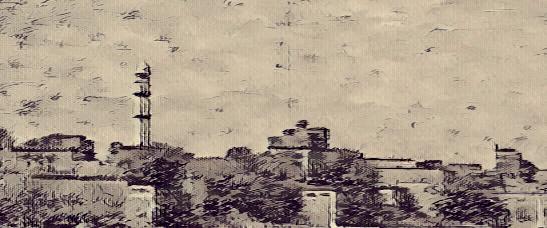
Grey hair
The Promised Messiahas used to say, “My hair started turning grey at the age of thirty and then they all turned white in a short span of time.”
(Translated by Al Hakam from the original Urdu, published in Zikr-e-Habib, pp. 29-31)
‘I don’t think this is really fair, Papa’: Explaining prohibition of interest to my six-year-old daughter
 Arif MA Economics and Politics
Arif MA Economics and Politics
Once upon a time, economics was the science of managing a household, then a subset of religious, theological, ethical and philosophical disciplines. But, little by little, it seems financial and debt issues became a repelling subset of mathematics, avoiding opinions as to what is good or bad. To give her mind the capacity to grasp the whole, I decided to make the experiment of explaining to my six-year-old daughter the prohibition of interest as stipulated by Islam:
“Imagine you need £100 to buy something, but you don’t have that amount of money. I have £100 and you have the possibility of borrowing it from me with the condition that you would give me £110 later.”
She looked at me innocently and said, “I don’t think this is really fair, Papa.”
“Oh, why is that?,” I asked.
“Because you only gave me £100 and you’re asking me for £110 back.”
“But you know the banks do that, they can even create £100 ‘magically’ and lend it to you.”

She slightly frowned at me and said, “If that was real, I just wouldn’t go to the banks!”
Three things are apparent from this rather amusing experiment.
First of all, based on her assertion that “if that was real,” I am fairly confident
in saying that she did not believe me. It is inconceivable for a human being to magically create something (in this case, money) without any effort. It is hard to believe, and yet it is true. Banks can create money through the accounting they use when they make loans. The figures we see when looking at our accounts’ balance are just mere accounting entries in the banks’ computers — that number did not exist before, and so the bank has created money out of nothing just by entering a number into your account's balance. These numbers are a “liability” or an acknowledgement of debt (IOU) from the bank to the account. However, by using a debit card or internet banking, one can spend these IOUs as though they were the same as normal notes and coins.
Secondly, she believes it is unfair and the just price of £100 is neither more nor less than £100.
Here is another reason why interest
has been prohibited in Islam. Indeed, in economic life, the fundamental unit is bound by the transaction involving at least two people. To make a just economic transaction, our conduct is bound by considerations of reciprocity and treating the other parties as we have been treated by them (‘adl). Thus, nowhere else does the golden rule “Do unto others as you would have them do unto you” apply more in economics than in any other field, and this is so because this rule involves an exchange and a transaction.
Finally, her innocent answers prove that interest is simply unnatural. She does not possess any financial skills or knowledge. Her words are the expression of basic human nature, which is not developed under the influence of environmental factors. What is not balanced (just) cannot be natural.
Try this experiment with any kids and you might be amazed and surprised how Islamic teachings are in tune with human nature!
Friday 2 December 2022 | AL HAKAM 16
Ahmed Danyal
Friday Sermon
Mubarak Mosque, Islamabad, UK, 4 November 2022
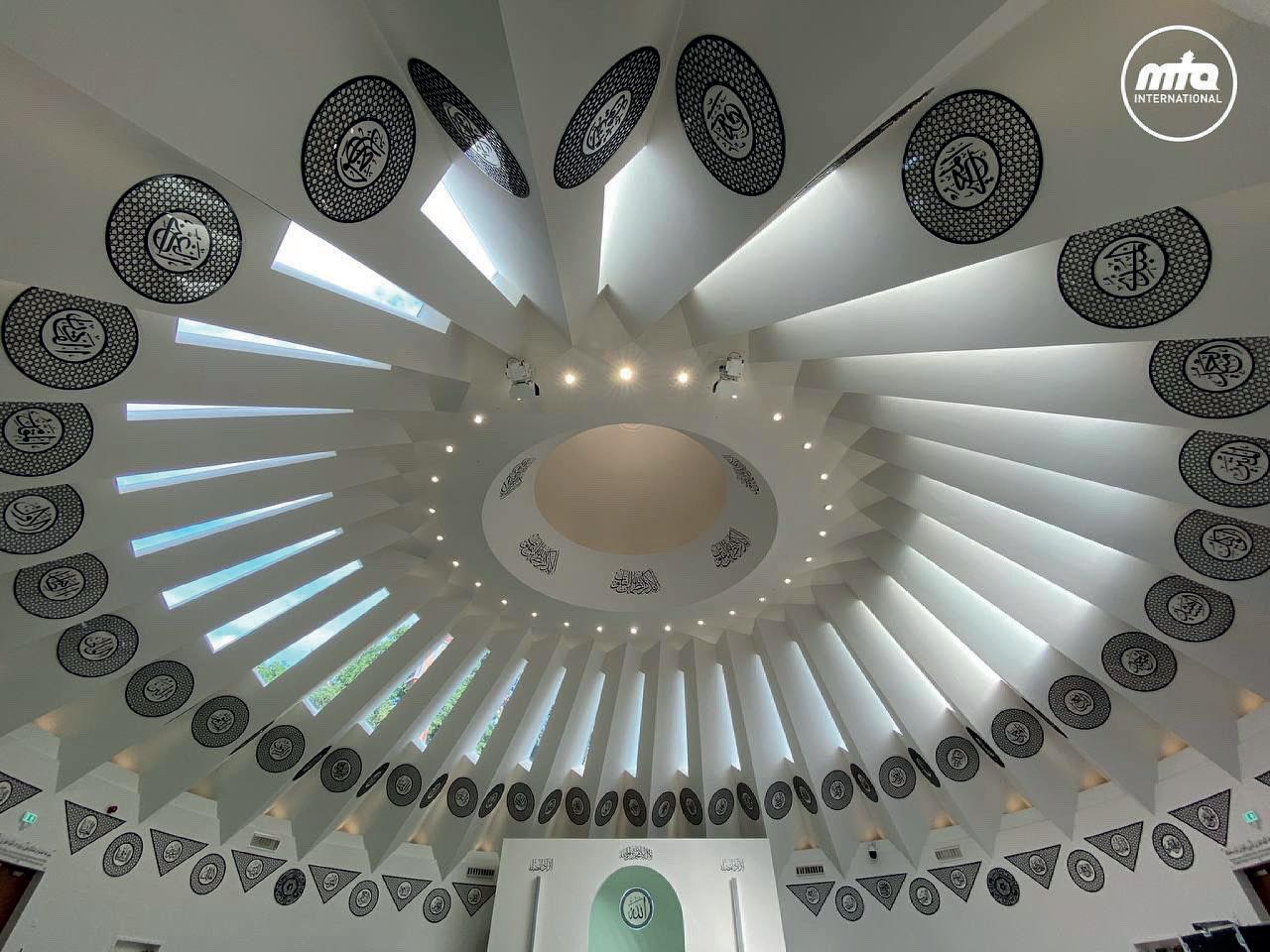
Blessings of Financial Sacrifice: Tehrik-e-Jadid New Year 2022
Today is the first Friday of November and as is customary, the new year for Tahrik-eJadid is announced during the first Friday Sermon of November. Also, the blessings which Allah the Almighty has showered [upon the Jamaat] during the previous year are mentioned. As such, I will say a few words in this regard today. First of all, it should be kept in mind that for any task and in order to meet its expenses, funds are required. Expounding upon this, the Promised Messiahas stated on one occasion that every prophet has made appeals for financial contribution for the completion of their objectives. (Malfuzat [1984], Vol. 1, p. 233)
Even in the Holy Quran, the attention of the believers has been drawn towards offering financial sacrifices from various
perspectives and in various ways.
Allah the Almighty has clearly stated that for the sacrifices one offers and the wealth they spend for the sake of religion, Allah the Almighty will reward them for it in this world as well as in the hereafter. Allah the Almighty does not remain indebted to anyone. For example, Allah the Almighty has stated at one place in relation to how abundantly He bestows. He says,
Allah multiplies it further for whomsoever He pleases and Allah is Bountiful, AllKnowing. [Surah al-Baqarah, Ch.2: V. 262]”
“The similitude of those who spend their wealth in the way of Allah is like the similitude of a grain of corn which grows seven ears, in each ear a hundred grains. And
Hence, this is the example of those believers, who spend in the way of Allah the Almighty. Allah the Almighty does not remain indebted to those who sincerely spend in His way. Rather, Allah the Almighty provides for them in this world as well as in the hereafter. In this era, Allah the Almighty has sent the true servant of the Holy Prophetsa for the propagation of the faith. And those who believe in him have also been entrusted with the task of fulfilling their responsibilities in order to propagate the faith, spread the message of Islam across the world and make the people of this world submit before the One God. If they [the followers of the Promised Messiahas] do so
sincerely, they will become recipients of the blessings and favours of Allah the Almighty. In one of the narrations, it is mentioned that the Holy Prophetsa said, “Prayers, fasting and the remembrance of Allah the Almighty return the wealth spent in His way up to 700 times.” (Sunan Abi Dawud, Kitab-ul-Jihad, Hadith 2497)
That is, along with the financial sacrifices one makes, these other aspects are also essential. Hence, in this Hadith, the image of a true believer has been described. A believer should not offer financial sacrifices simply so they can say to Allah the Almighty that “I have sacrificed such an amount of wealth, now increase it 700 times and return it to me in accordance with what You have stated.” Certainly not, in fact, along with this, one will have to elevate the standards
17 AL HAKAM | Friday 2 December 2022
After reciting the tashahud, ta’awuz and Surah al-Fatihah, Hazrat Khalifatul Masih Vaa stated:
ۃبح لثمک ہللا لیبس یف مہلاوما نوقفنی نیذلا لثم فعضی ہللاو ؕ ۃبح ۃئام ۃلبنس لک یف لبانس عبس تتبنا میلع عساو ہللاو ؕ ءآشی نمِل
of their worship as well. They will have to improve their inner state and continuously remain engaged in the remembrance of Allah the Almighty.
One will need to avoid vain pursuits and offer financial sacrifices purely for the sake of seeking the pleasure of Allah the Almighty. In return, Allah the Almighty bestows His blessings upon a person in such a manner that it leaves one astonished. At times, Allah the Almighty grants acceptance to even a small action of a person and bestows upon one in a manner that leaves one amazed. This is the special mercy of Allah that He bestows upon a person in this way, through which one can increase in their faith in Allah the Almighty and their faith increases in His words even more than before. However, one should try their utmost not to become elated by the fact that they have sacrificed such and such amount and think that even though they do not perform other acts, Allah will certainly bless them. Even those who make financial sacrifices must look to improve their spiritual conditions. Only then will they become the true recipients of the favours of Allah the Almighty. Allah the Almighty always bestows His blessings upon true believers and countless examples of this are present in the [Ahmadiyya] Community. We do not only present the examples of those before us; indeed, we know the examples of the people of the past and their conviction that Allah the Almighty would bless them but we even find examples today. From among the people of the past, there is an incident of Hazrat Rabiah Basri. How great was her trust in Allah the Almighty. One day, she was in her house when all of a sudden 20 guests came. She only had two pieces of bread in the house. She said to her worker, “Go and give these two pieces of bread to a poor person.” This was an extraordinary example of trust in Allah. The worker was surprised and thought that these pious people are rather heedless; there were guests present in the house and despite there only being two pieces of bread in the house, she was ordered to give those to the poor. A short while later, when she was contemplating this and about to leave – or perhaps she had just returned – she heard a call from outside. An affluent woman had sent someone with 18 pieces of bread with her. Hazrat Rabiah Basri returned the
bread, saying that it did not belong to her. Her worker insisted that she should take them and said that Allah the Almighty had sent them, but despite her insistence, Hazrat Rabiah Basri refused to take them and said that they did not belong to her. Soon after, the affluent lady who lived nearby called out to her worker, saying: “Where have you gone to? You were supposed to take 20 pieces of bread to Rabiah Basri’s house, these [18] pieces of bread were not for her. I had sent this for someone else.” Rabiah Basri said: “In place of the two pieces of bread, I asked Allah the Almighty, that He may grant me 10 fold in return. That is why I ought to have received 20 pieces of bread.”
Hazrat Khalifatul Masih Ira mentioned this incident and referred to various verses of the Holy Quran. He stated: “At certain places, there is mention that a person would receive 10 in place of one and in other places, it is mentioned that they would receive 700 in place of one. This return depends on the virtue and the situation at hand.” i.e. on what occasion a person offers a sacrifice and how much they sacrifice, to what extent does the person who offers sacrifice go to.
As stated before, Hazrat Khalifatul Masih Ira mentioned this incident of Rabiah Basri and said: “Allah the Almighty bestows blessings in this way. However, you should not test Allah the Almighty in this way every time.” (Haqaiq-ul-Furqan, Vol. 1, pp. 420-421)
It means that it should not be the case that one decides to do this every time and test Allah the Almighty) Indeed, if you offer sacrifices sincerely for the sake of Allah the Almighty, then certainly He will bestow His blessings.
Thus, those who sacrifice for the religion of Allah and in order to seek His pleasure, are the ones who truly offer a sacrifice. Although the example of Rabiah Basri’s incident seems like a personal one wherein she received some guests, however, people would go to see her for the sake of [learning about] religion.
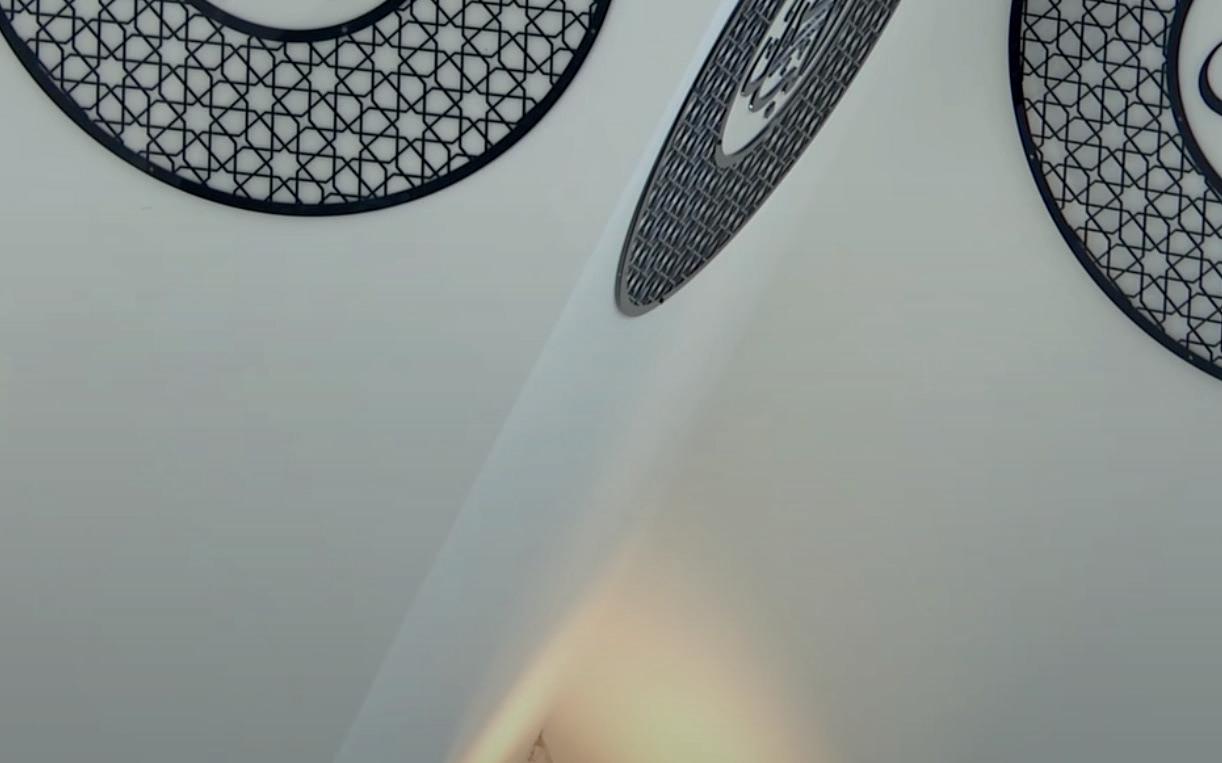
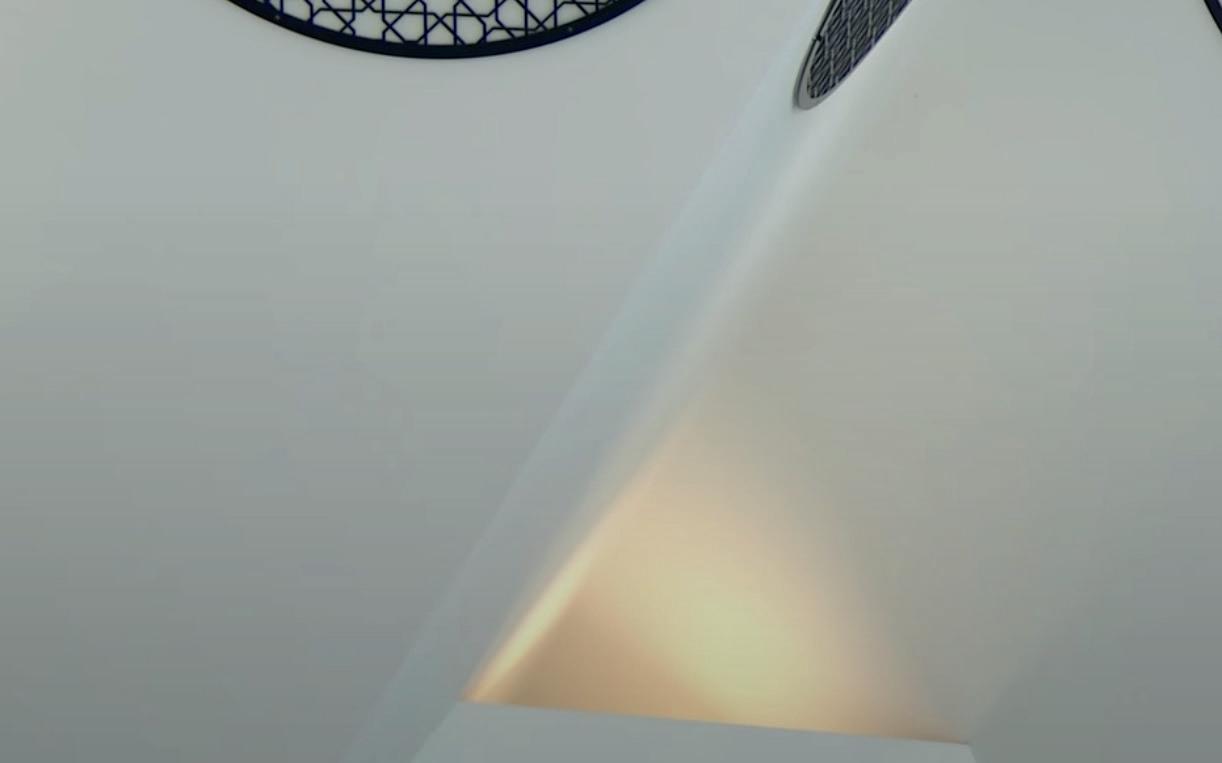
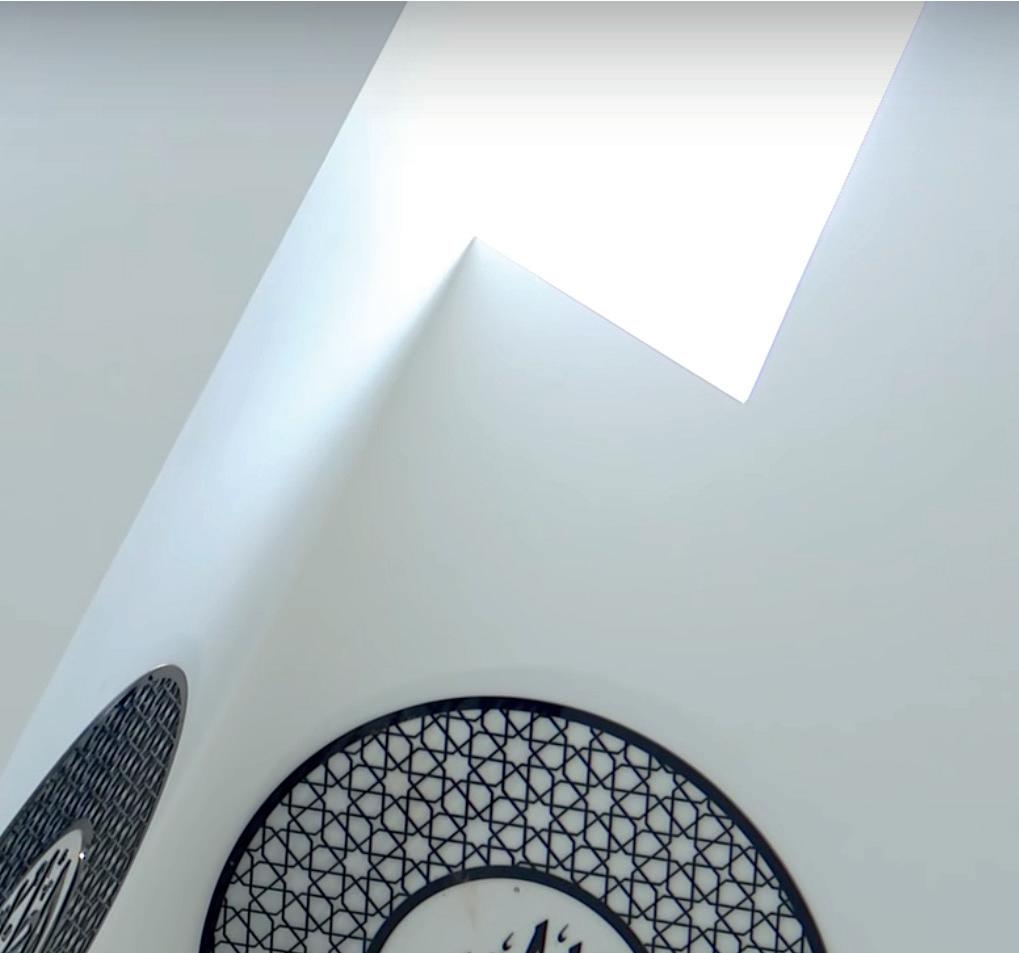
Nonetheless, in order to complete the purpose of propagating the faith, Allah the Almighty has sent the Ardent Devotee of the Holy Prophetsa and through him, today, Islam is being propagated throughout the world and services to humanity are being carried out.

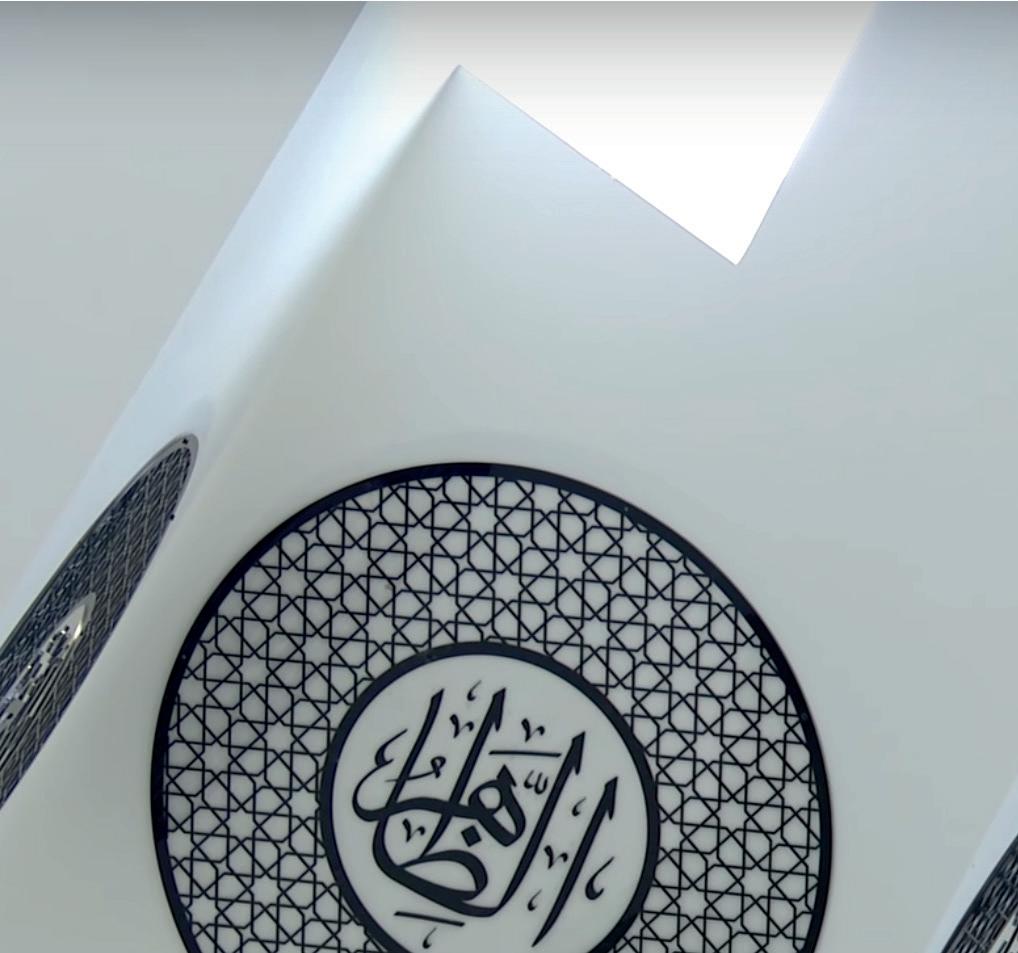
By the grace of Allah Almighty, every year the Jamaat spends millions of pounds on distributing literature, constructing mosques and mission houses, and other initiatives. The majority of wealth collected from Europe and other developed countries is spent in Africa, India and other poorer countries and this is aside from the expenses they are carrying out within their countries towards these objectives. It is the sheer grace of Allah Almighty that the scope of this work has increased so much that members of the Community are making sacrifices and fulfilling these needs, in spite of the worsening economic circumstances. Today too, Allah the Almighty is showing how He treats such people, i.e., how He blesses those who make sacrifices. Those living in poorer countries and those in developed countries all have their own experiences as they sacrifice their own needs in order to give in the way of Allah.
I shall now present a few accounts that highlight just how Allah the Almighty treats those who make sacrifices and they demonstrate the passion with which these devoted people present their sacrifices. Even new converts who have recently accepted Ahmadiyyat and Islam are automatically drawn towards making financial sacrifices and this is because they have come to understand the true spirit of financial sacrifice.
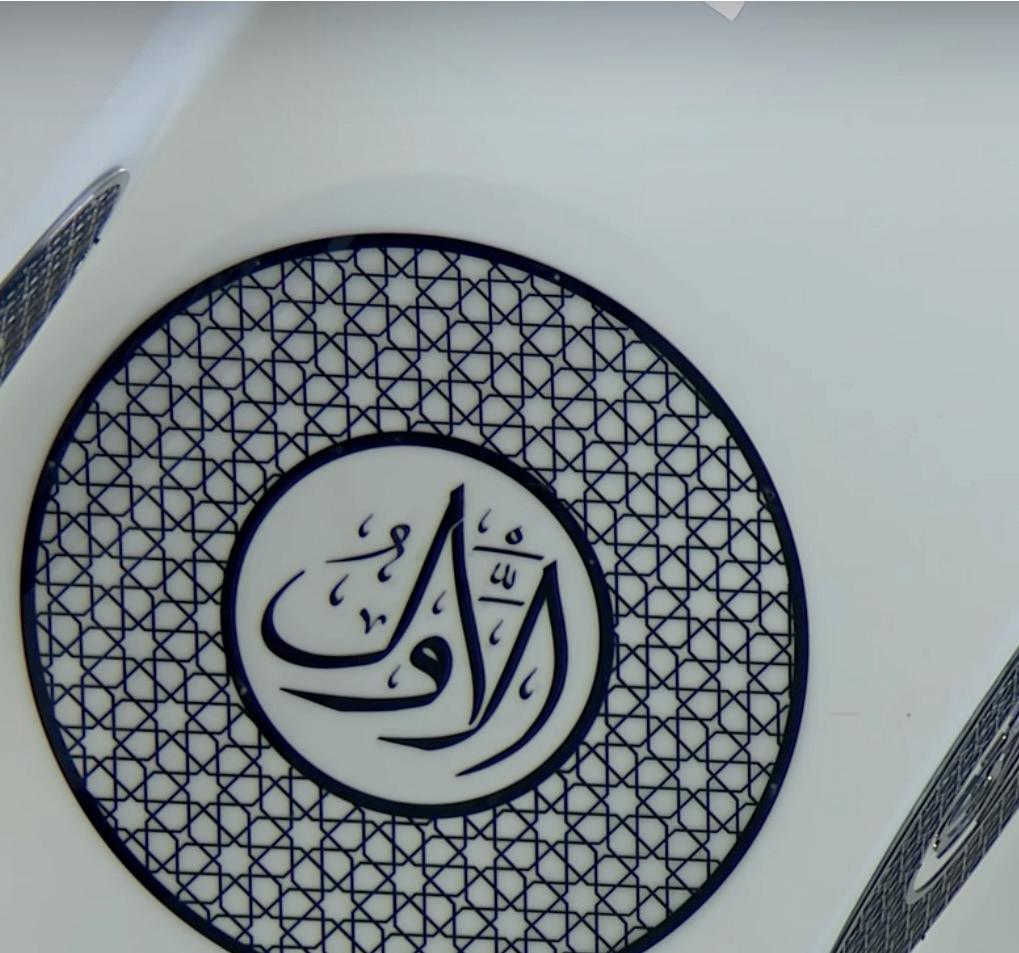
Muhammad Johnson, a local mu’allim from Liberia who was previously a Christian and became a mu’allim after accepting Islam, says, “As a result of our tabligh efforts a few months ago, our Jamaat was established in a village of our county. The people of this village, including its imam, all joined the Community. This is a very small village that has no proper roads leading to it. It was also difficult to reach there due to the rain. With regards to collecting donations for Tahrik-e-Jadid, we overlooked this village on purpose.” They had only just become Ahmadis, and it was very difficult to get there as the journey was dangerous, and it was only a very small village, hence, they would encourage them the following year. He says, “One day, out of the blue, the Imam Abu Bokai Sahib came to the Tubmanburg mission house and upon his arrival, handed a sum of money, saying that it was from 21 members of the Community
towards Tahrik-e-Jadid. When asked as to how he had known, as they hadn’t been urged to do so, he replied, ‘I regularly listen to the radio programme of the Community and heard you last week speaking on the radio introducing Tahrik-e-Jadid and highlighting its importance, I then relayed this to the people of my Jamaat. Thereupon, the members made this donation.’” This is how Allah Almighty places it in the hearts of the people and instils the spirit of sacrifice within them.
Amir Sahib of The Gambia writes, “Efforts were made to encourage donations towards Tahrik-e-Jadid in a village where all the members are new converts. Sister Fato, a 77-year-old woman, took out 200 dalasis (which is the currency there) and donated it. She said, ‘This is the only way for anyone to spread the teachings of true Islam Ahmadiyyat, just as it was done in the time of the Holy Prophetsa.’ She said that it was the only amount of money she had left, which she was saving to buy food for her family (it is not the case that she was a wealthy woman). She donated 200 dalasis and said, ‘I am doing so as there is a need for it for the propagation of Islam. I shall sacrifice by going hungry and this is the amount I am donating.’” [Amir Sahib] says, “As this was being said, she received a phone call from her son in Switzerland, and he said that he had sent 12,200 dalasis. Thereupon the woman cried as she announced to those present there as to how Allah the Almighty had just blessed her. She said, ‘I shall donate even more,” and the people were amazed by this. Over six months had passed and her son had not been in contact, nor enquired about his mother, even though things were not going well for her financially. However, on this occasion, it so happened that Allah Almighty brought about the means whereby she received his phone call along with the amount. This profoundly influenced the people to believe that Ahmadiyyat is the true Islam, and they all made an oath to remain firm in Ahmadiyyat until their last breath.”
The local mu’allim of the Jamaat in the Geita region, in the Northwest of Tanzania, writes, “A young man named Abdullah Sahib pledged his allegiance a few months ago. One day he heard about Tahrik-eJadid in a Friday sermon. He learnt that it was the final month for its collections, and that every Ahmadi should try to participate in it by donating whatever they could within their means for the sake of attaining blessings. Abdullah Sahib had no money at the time. He promised that by the following evening he would most certainly donate an amount towards Tahrik-e-Jadid. So the next day, he went out in search of work. One man needed manpower to cultivate his land, so he gave Abdullah Sahib the job. He worked with great effort throughout the entire day on the task assigned to him, and in normal circumstances, it would have taken two days to complete, yet he was able to complete it by the evening. He took the money he was given and donated it towards Tahrik-eJadid. Relating this incident, he said, ‘Allah Almighty blessed my intentions and it was His sheer grace that I was able to make a financial sacrifice.’” This is how awareness is also being raised.
There is an island called Solomon Island, which is near Australia. The missionary in Australia writes, “During the tour of
Friday 2 December 2022 | AL HAKAM 18
Solomon Island, aside from the moral training and tabligh programmes, with regards to the ending of the Tahrik-e-Jadid year, the people were also encouraged and their attention was drawn towards participating in it. There is a woman there whose husband is a non-Muslim and they both run a poultry farm. When the Tahrike-Jadid secretary visited their home to remind her about making a donation, she was not at home. The children, therefore, donated whatever amount they had. When the woman returned home, her children told her that the Tahrik-e-Jadid secretary had come, so she immediately went to his house and donated 1,000 dollars towards Tahrik-e-Jadid, upon which the secretary said, ‘I have already collected the donations from everyone and sent off the list having filled it, so I can put this down for the next year.’ She replied, ‘No, I have made a promise to God Almighty that I would donate this amount, so count it for this year.’ Thus, upon her request, a new list was prepared and the centre was informed of this late into the night.”
We also witness just how Allah the Almighty gives back manifold. The missionary of Guinea-Conakry writes that he delivered a Friday sermon in a place called Kafilya, with regards to Tahrike-Jadid, drawing attention towards the scheme. He then went to visit houses individually. He met a young man named Muhammad Sylla Sahib and encouraged him to make a donation. There and then he took out 10,000 francs from his pocket and donated it towards Tahrik-e-Jadid, saying, “This is what I have, which I was going to use to buy my lunch and dinner, but today I shall go hungry for the sake of Allah.” Four days after this incident, the missionary received a phone call from this man and he said, “Allah the Almighty has accepted my sacrifice. I sat for an interview for a job as a driver at a mining company. By the grace of Allah, I received a five-year contract with an income of 5.5 million francs a month. So in this way Allah Almighty has given me thousands of times more in return.” He had donated 10,000 francs for the year, and what he received in return for a year was 6,600 times greater. Allah Almighty states that He gives 700 times more, and if He so wills, He can give even more than that. Hence, we have witnessed here how He gives manifold.
Then, the Sadr Lajna in Niger writes, “By the grace of Allah, Lajna Imaillah Niger had the opportunity to hold its first three-day national tarbiyati class and many women participated in it. Their attention was also drawn towards donating to Tahrike-Jadid, as there remained only a short time before the end of the year, and they were encouraged to fulfil their promises as soon as possible.” She says, “There and then the women began to present their donations, and despite them being told that they were only being encouraged and that there was still time, they insisted on giving it immediately. Seeing them, other women also came forward and presented financial sacrifices, and in this way, a large amount was received.”
By the grace of Allah the Almighty almost in every part of the world, the women, in light of their numbers, fulfil their promises and do not remain behind anyone. At times, in certain countries, the Khuddam and Ansar need to be reminded that the
Lajna members have surpassed them, and so they too should donate accordingly.
The missionary of St. Petersburg, Russia, writes, “A member by the name of Arsaan Baik Sahib lives in one of the Russian states. Upon the announcement of the new year of Tahrik-e-Jadid that I made last year, Arsaan Sahib, who had previously contributed 1000 Rubles to Tahrik-e-Jadid, stated, ‘This year, I pledge to contribute 10,000 Rubles. Furthermore, he said that he was about to start a business. Nonetheless, he fulfilled his pledge of 10,000 Rubles in July.’” The circumstances in Russia are quite difficult as a result of the war in Ukraine, however, he fulfilled his pledge. Apart from that, the value of the Ruble has also fallen considerably. This amount of 10,000 Rubles is equivalent to 178 Euros, however, in light of the circumstances [in Russia], this is a large sum. The missionary further states, “After donating this amount, he said, ‘I will continue to contribute 500 Rubles regularly. (He continued to donate 500 Rubles every single day and said) I am earning a lot because, by the grace of Allah, my business has been very fruitful.” He did all of this despite the dire circumstances there. Following this, he increased the amount to 1000 Rubles and donated this every day.
A mu’allim from Maroua, a city in Southern Cameroon, writes – this, too, is an incident related to how the faith of the poor was strengthened through the blessings of chanda. His name is Abdullah and he is a new convert. He is extremely poor and last year gave half a bucket of cornmeal towards Tahrik-e-Jadid (which is about five kilograms). He states, “As a result, Allah the Almighty has granted me five sacks (350 kilograms, meaning that it increased 70 times over).” He further said, “This year, I was very worried because the prices had increased and the fertilizer was much more expensive, due to which I could not purchase any. I feared that my crop would not have a positive outcome.” Regardless, he says, “I tried as much as I could, and Allah the Almighty blessed it in such a way that this year’s crop had doubled.” He even gave a 70-kilogram sack toward Tahrik-eJadid. He further says, “I even tell my family that through the blessings of contributing towards Tahrik-e-Jadid, God Almighty blesses my efforts and crop.”
These are short and brief incidents, yet they are of utmost importance for Ahmadis who are poor. Amir Sahib of The Gambia writes that a member, Pathe Sisay lives in a village and took the pledge of allegiance in 2014 recounted, “I was unemployed before I entered the fold of Ahmadiyyat. I tried many times to find employment, but I remained unsuccessful.” He continues, “When I entered the fold of Ahmadiyyat, I began to participate actively in chanda and propagating the message of Islam.” Now, he has two jobs, whereas before, not only was he unemployed, but he did not have a place to live. He has now also built a house for himself made of a solid structure. People claim that the Jamaat provided him with financial aid. In response, he says, “The Jamaat did not give me financial aid. Instead, Allah the Almighty has helped me through the blessings of chanda.”
Amir Sahib of Indonesia writes, “There is an Ahmadi here who owns a factory and has been struggling. Last year, when inspiring accounts with respect to Tahrik-
e-Jadid were shared and the new year was announced, it had a great and deep impact on him. At the time, he immediately pledged double the amount he had from the previous year and fulfilled that as well. Just one week after that, Allah the Almighty rewarded him and his sales started to rise. Similarly, a company that had previously ceased its dealings returned for business and requested large purchases. He says that this year, his company’s income has increased manifold from the previous years.”
Farhad Sahib, a missionary in Germany, writes, “A lady in Wiesbaden was made redundant from her job. She no longer had any income. She had also sponsored her husband to come to Germany but could no longer do so and expressed her concern to her brother. Her brother responded by saying that the only solution now was to pray and partake in chanda and make a financial sacrifice. She gave chanda from the money she received after selling her jewellery. Just four days later, she received a message from her employer saying that she would be permanently employed and that her [monthly] salary would be 2000 Euros which would allow her to sponsor her husband.”
The Wakil-ul-Maal Sahib in India writes, “There is an individual here who is at the forefront in contributing towards Tahrik-e-Jadid. When he was encouraged to increase his contributions, he asked how much he should increase. He was told that he should make an increase based on his income and circumstances, however, he was insistent to the administration, rather to the missionary or representative from headquarters that they should give him an amount. Therefore, the representative said that he should increase his contributions by 1,000,000 rupees. He had already contributed 500,000 rupees. Nevertheless, he increased his pledge and also fulfilled it. He says, ‘I have a property for which I could not complete the registration. I thought that I would face a great loss as a result of it, however, a few days after increasing my contributions, it worked out for me. The matter had been pending for some time, however, Allah the Almighty saved me from any loss.’” Thus, Allah the Almighty does not remain indebted to anyone, neither the affluent, nor the poor; He rewards everyone based on their circumstances.
Once again, the Wakil-ul-Maal Sahib from India writes, “In Kashmir, there is a doctor who is a professor at the Shere-Kashmir University. After making contributions and fulfilling his pledge, he said, ‘I have been promoted as the Professorcum-Chief Scientist in agronomy and my salary has also increased extraordinarily.’ Upon this, he increased his contributions toward Tahrik-e-Jadid.”
A lady from Mauritius writes, “Last year, after hearing about the accounts of relatives in respect to Tahrik-e-Jadid, my husband said to me that we should pledge to contribute an amount that is slightly difficult to fulfil. Thus, we made a pledge of 75,000 rupees (these are Mauritian rupees). At the time, my husband worked for a medical company. In the past three years, there had been an insignificant increase in his salary, however, after pledging this amount, he received a job offer from a private hospital. At the same time, my husband had also gifted 1000 [rupees] to his
mother. My husband said that with regard to the interview, he had a feeling that he would get the job and his salary would be close to what he had pledged to sacrifice [for Tahrik-e-Jadid]. After the interview, he was hired and was offered a salary of 76,000 rupees (whereas he had pledged 75,000). He said that Allah the Almighty even returned the 1000 rupees that he gave to his mother.”
A missionary in Bangladesh writes, “An individual here faced a great loss during the Coronavirus pandemic. He also had outstanding amounts in his chanda When a reminder for Tahrik-e-Jadid was sent, he gave 11,500 takas from his wife’s savings box, but that was only half of the outstanding amount.” Nonetheless, he says, “At the end of the month, his wife informed us that we could come and collect the remaining amount. When our team went there, they contributed three times the amount that they had pledged and also paid their outstanding amounts in obligatory contributions. They informed us that God had fulfilled a long-awaited need; for a long time, they had been searching for a plot of land for a property. When they started to partake in chanda, God miraculously enabled them to purchase a plot of land for constructing their property. Their income increased, they were able to give chanda and Allah the Almighty enabled them to build their property.”
There is a teacher in Burkina Faso who writes, “I had the opportunity to purchase a car. Upon this, the other teachers said that as teachers, they could not afford to purchase a car and that the Jamaat had surely given me financial aid.” He continues, “I responded by saying that the Jamaat did not give me financial aid, but Allah the Almighty blessed my wealth due to the blessings of chanda.” He further states, ‘From my days as a student, I had made it a habit to give chanda and Allah the Almighty has always rewarded me for it.”
A member from Osnabrück, Germany, writes, “There was an event held on the topic of Tahrik-e-Jadid.” He says, “I brought 500 Euros to contribute as an additional amount, but I was told that the receipt book had been filled.” He says, “I went back and gave the amount as wages for labour (he gave the amount to those he had employed).” That night, he saw me in a dream. He said, “You were telling me (I was saying to him) that you need 5000 Euros. I understood that this was referring to contributions for Tahrik-eJadid. I told my wife about the dream and she said that we will increase our contributions toward Tahrik-e-Jadid by 5000 Euros.’ He also says: ‘Sometime after this, an amount of more than 22,000 was deposited into my account for Corona Help which was something beyond our imagination.’
A Lajna member from Canada says: “I was facing financial difficulty and was very concerned as to how I would be able to fulfil my promise [for Tahrik-e-Jadid] and was also praying for this as well. My intentions were virtuous, however, I could not see any hope and I continued to pray. One evening, my daughter was searching for her birth certificate and found an old purse.”
She says, “Before going to the USA (they had travelled to the USA eight years ago), I had kept some money to spend there and whatever had been leftover from that, I had put it in this purse and had completely forgotten about it. When I took the money
19 AL HAKAM | Friday 2 December 2022
out, it was exactly the amount I needed to pay my chanda.”
Thus, Allah the Almighty also helps in this way as well.
The president of Guinea Conakry writes: “There is a very poor Ahmadi lady, who sells very basic items in order to get by. During the period when members were being especially encouraged to contribute to Tahrik-e-Jadid, they also visited her house and reminded her about Tahrik-e-Jadid. Upon this, she said, ‘I am very concerned due to my very meagre income. I took a loan in order to start my business and my income is almost next to nothing and I cannot even repay my loan.’ In any case, they explained to her [the importance of Tahrik-e-Jadid] and also told her to pray. The lady donated 20,000 CFA towards the chanda. This was a very large amount for this lady, who was struggling due to her circumstances. A few days later, when one of our missionaries went to see her again for some other matter, she said in a passionate manner and filled with joy that ‘Allah the Almighty had resolved all my difficulties. My small business has started to flourish and I have also repaid my loan. This is all due to the financial sacrifice I made.’”
Farid Ibrahimov from Tatarstan, Russia, says, “In the summer of last year, something rather strange happened with my phone. After receiving money in my online account from my passengers, the sermon of the Khalifa of the time regarding financial contributions began to play on my smartphone by itself. This did not just happen once, in fact, whenever a large amount would be transferred to my account, an incident like this would occur. From this, I learnt that by giving proof of His existence, Allah the Almighty is reminding me that it is a matter of great honour for me to be part of the Jamaat of the Promised Messiahas and have the opportunity to offer financial sacrifices.”
Thus, it so happens that a sermon comes on by itself or some form of message is received on the phone and in this way, it serves as a reminder for the person to pay their chanda
A very devout lady from Tanzania says that upon returning from Jalsa, she realised that some of her chanda for Tahrik-e-Jadid was yet to be paid. She could not think of any way how she would be able to pay it. Someone had taken a loan from her and she was hopeful that they would return it and through that, she would be able to pay her chanda. However, the person was neither responding and nor answering her call. She was unwell and due to her medications, her expenses were continuously increasing by the day. She was very worried as she also had to pay for her children’s school fees. She told her children to also pray and as she was saying this, the sound of the Azan appeared and her child said that they should go for Salat and ask God. (Through this, Allah the Almighty also strengthens the faith of the children as well.) The child said, “We do not have any money and Allah the Almighty may accept our prayer and may influence his heart and thus he repays us.” Subsequently, both mother and son performed the ablution and fervently prayed before Allah the Almighty. Allah works in such ways that even before they had finished their prayer,
the phone started to ring and the person calling was the one who had borrowed money from them. The person calling said that he was standing outside the door in order to return the money. He then said that he was standing at the bus stop waiting for a wagon, when he heard the Azan and along with this, he felt as if someone was also saying that he should first repay the loan he had taken. And so, he said he had come to return the money. The mother and the child heard this entire incident and their hearts were filled with praise for Allah the Almighty. They expressed their gratitude to Allah the Almighty and the child stated, “we offered our prayer and Allah the Almighty also returned our money.” They then used that money to fulfil their various needs.
Ikram Jaan Sahib from Saint Petersburg says, “I always pray to be financially welloff so that I can help those in need and particularly so that I can pay towards the various chandas. This prayer is always fulfilled in miraculous ways. Last time, I was short of 3,000 Rubles and it was the last day to pay the chanda. Whilst at work, two people came to me suddenly and one of them gave me 1,000 Rubles and the other gave 2,000 Rubles. This has never happened to me before because normally I receive around 300 to 500 Rubles from work. Now, I always give my extra income in the way of Allah the Almighty.”
These are just a few accounts which I have presented which highlight how Allah the Almighty treats those people who offer financial sacrifice in a sincere manner.
Now, I shall announce the commencement of the new year of Tahrike-Jadid. The 88th year has come to an end on 31 October and the 89th year has now started on 1 November. This year, the members of the Jamaat have presented a total financial sacrifice of 16.4 million pounds towards the financial scheme of Tahrik-e-Jadid, alhamdulillah. By the grace of Allah the Almighty, despite the increasingly deteriorating economic situation of the world, there is an increase of 1.1 million pounds from the previous year’s collection. Just like the previous year, Germany Jamaat has stood first amongst all the jamaats of the world by the grace of Allah the Almighty. Pakistan has also made a great sacrifice, but since their economic circumstances are not good, they have fallen behind in their position, but only due to the drop in the value of their currency, however, in terms of their level of sacrifice, they have continued to make progress.
Although Germany is first, with regards to their local currency, they have had less collection [from before]. And if UK and USA continue with the progress they are making, they could go ahead of them. Similarly, there has been significant progress by Canada, Australia, India and Ghana.
Some of the other jamaats that have made a notable effort are Holland, France, Sweden, Georgia, Norway, Belgium, Burma, Malaysia, New Zealand, Bangladesh, Kiribati, Kazakhstan, Tatarstan, Philippines and a jamaat from the Middle East.
In terms of the total collection among the jamaats in Africa, the notable jamaats are Ghana, Mauritius (this is also part of Africa), Nigeria, Burkina Faso, Tanzania, Gambia, Liberia, Uganda, Sierra Leone and
Benin.
In terms of contribution per capita, USA is first, then UK and Australia.
By the grace of Allah the Almighty, the total number of people who have participated is 1,596,000. The notable jamaats from among Africa who had an increase in participation are Nigeria, Guinea Bissau, Congo Brazzaville, Guinea Conakry, Tanzania, Congo Kinshasa, Gambia, Cameroon, Ivory Coast, Niger, Senegal and Burkina Faso.
The contributions from the members of Daftar Awwal are still being paid by the grace of Allah.
The first 10 jamaats of Germany are as follows: Rödermark, Rodgau, Mahdi-Abad, Nieda, Köln, Flörsheim, Neuss, Pinneberg, Osnabrück and Friedberg.
The position of the local Amarats is as follows: Hamburg, Frankfurt, GrossGerau, Wiesbaden, Dietzenbach, Riedstadt, Mörfelden, Rüsselsheim, Darmstadt and Mannheim.
In terms of the total collection in Pakistan, Lahore is first followed by Rabwah and then Karachi.
The position of the top ten districts [in Pakistan] is as follows: Sialkot, Islamabad, Gujranwala, Gujrat, Umerkot, Hyderabad, Mirpur Khas, Sargodha, Quetta and Lodhran.
The areas of Umerkot and Mirpur Khas were recently affected by floods and rain. By the grace of Allah the Almighty people in these areas have offered great sacrifices.
In terms of the highest contribution amongst the local jamaats in Pakistan, they are as follows: Amarat Township Lahore, Amarat Dar-ul-Zikr Lahore, Amarat Model Town Lahore, Amarat Mughalpura Lahore, Amarat Allamah Iqbal Town Lahore, Amarat Baitul Fazal Faisalabad, Amarat Azizabad Karachi, Amarat Delhi Gate Lahore, Amarat Karimnagar Faisalabad and then Amarat Sadr Karachi.
The top five regions in UK are as follows: Bait-ul-Futuh, Islamabad, Fazl Mosque, Midlands and Bait-ul-Ihsan.
The top 10 positions of the larger jamaats of the UK, in terms of the total collection, are as follows: Farnham, South Cheam, Islamabad, Worcester Park, Walsall, Gillingham, Fazl Mosque, Ewell, Aldershot South and Putney.
The position of the smaller jamaats of the UK in terms of their total collection is as follows: Spen Valley, Keighley, North Wales, Northampton and Swansea.
The top 10 positions of the jamaats of the USA, in terms of the total collection, are as follows: Maryland, followed by Los Angeles, North Virginia, Detroit, Silicon Valley, Chicago, Seattle, Oshkosh, South Virginia, Atlanta, Georgia, North Jersey and York.
In terms of the total contribution, the positions of the local amarats in Canada are as follows: Vaughan, Peace Village, Calgary, Vancouver and then Toronto.
In terms of the total contribution, the top ten jamaats of India are as follows: Coimbatore (Tamil Nadu), Qadian, Hyderabad, Karulai, Pathapiriyam, Calicut, Bangalore, Melapalayam, Kolkata and Kerang.
The top ten provinces [in India] in terms of their total contribution are as follows:
Kerala is first, followed by Tamil Nadu, Karnataka, Jammu Kashmir, Telangana, Odisha, Punjab, Bengal, Delhi, Maharashtra.
The top ten jamaats of Australia are as follows:
Castle Hill, Melbourne Long Warren, Melbourne Berwick, Marsden Park, Penrith, Parramatta, Adelaide West, ACT Canberra and Brisbane Logan East.
These were the positions. May Allah the Almighty greatly bless all those who have offered financial sacrifices and also bless their wealth.
The UK jamaat has prepared a new website, which is about the history of the Ahmadiyya Jamaat in UK. Work on researching and collating the history was being done for many years and now a website has been prepared which includes research articles in relation to the efforts of the Promised Messiahas in propagating the message of Islam to the West. The history of the Ahmadiyya Jamaat in UK is generally considered to have started in 1913, when Chaudhry Fateh Muhammad Sayal Sahib came here. However, the message of the Promised Messiahas had already reached UK and other European countries from the moment he announced he was the Mujaddid [reformer]. The Promised Messiahas published 8,000 copies of an announcement in English in order to inform people of his claim. These were distributed amongst the well-known and highly respected priests in India and England. They were also sent to various societies and religious leaders and this message was sent to as many places as it was possible to send in those days. For example, a politician in the UK, Charles Bradlaugh, who was an atheist, received the message of the Promised Messiahas in 1885. This has been mentioned in the newspaper, Cork Constitution of 8 June 1885. Similarly, one of the founding members of The Theosophist Society, Henry Steel Olcott, received this message in 1886, which he mentioned in the September issue of his journal, The Theosophist in 1886.
A timeline of the blessed era of the Promised Messiahas has also been published on the website, which includes various facts about the propagation of Islam in the West. Also, another timeline has been prepared under the title of Pioneer Missionaries which includes the early missionaries of the community, among whom were also companions of the Promised Messiahas and it includes their introduction and information about their missionary efforts in the UK. There is also detailed research, along with references, on the prophecy of the Promised Messiahas regarding Piggott. There are some further research articles based on the history [of the UK jamaat] through which the youth will be able to clearly learn about the true objective of why they and their forefathers had come to the UK. The address of this website is history. ahmadiyya.uk. Although the website has started, they want to formally inaugurate it today. May Allah the Almighty enable this to be a source of benefit for our members and also the non-Ahmadis.
(Official Urdu transcript published in Al Fazl International, 25 November 2022, pp. 5-10.
Translated by The Review of Religions.)
| © Al
2022 Friday 2 December 2022 | AL HAKAM 20
Editor: Qaasid Muin Ahmad | Design & Layout: Jalees Ahmad | Sub-Editorial: Ataul Fatir Tahir, Aqeel Ahmed Kang | News: Ata-ul-Haye Nasir
Hakam




















 Hazrat Maulvi Sher Ali Sahibra (18751947)
Hazrat Maulvi Sher Ali Sahibra (18751947)





 Arif MA Economics and Politics
Arif MA Economics and Politics







